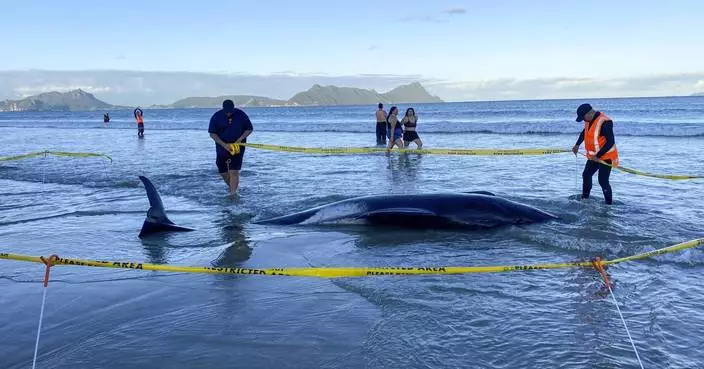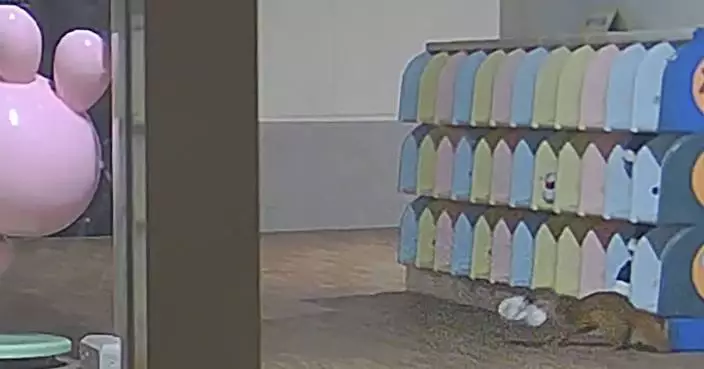MONTEVIDEO, Uruguay (AP) — Uruguay's leftist opposition candidate, Yamandú Orsi, became the country's new president in a tight runoff Sunday, ousting the conservative governing coalition and making the South American nation the latest to rebuke the incumbent party in a year of landmark elections worldwide.
Even as the vote count continued, Álvaro Delgado, the presidential candidate for the center-right ruling coalition, conceded defeat to his challenger while surrounded by sullen-looking family members and colleagues.
Click to Gallery
A voter chooses his preference at polling station in the presidential run-off election in Montevideo, Uruguay, Sunday, Nov. 24, 2024. (AP Photo/Natacha Pisarenko)
Alvaro Delgado, candidate for the ruling National Party, waves after voting in the presidential run-off election in Montevideo, Uruguay, Sunday, Nov. 24, 2024. (AP Photo/Natacha Pisarenko)
A woman votes in the presidential run-off election in Canelones, Uruguay, Sunday, Nov. 24, 2024. (AP Photo/Matilde Campodonico)
Yeni Varone, a nurse, casts her vote in the presidential run-off election in Montevideo, Uruguay, Sunday, Nov. 24, 2024. (AP Photo/Natacha Pisarenko)
A voter wrapped in a flag of the Frente Amplio (Broad Front) arrives to a polling station to vote in the presidential run-off in Montevideo, Uruguay, Sunday, Nov. 24, 2024. (AP Photo/Matilde Campodonico)
A voter casts his ballot for the presidential run-off election in Canelones, Uruguay, Sunday, Nov. 24, 2024. (AP Photo/Matilde Campodonico)
Yamandu Orsi, presidential candidate from the Frente Amplio (Broad Front), votes in the presidential run-off election in Canelones, Uruguay, Sunday, Nov. 24, 2024. (AP Photo/Matilde Campodonico)
Supporters of the Broad Front (Frente Amplio) celebrate the victory of candidate Yamandú Orsi in the presidential run-off election in Montevideo, Uruguay, Sunday, Nov. 24, 2024. (AP Photo/Matilde Campodonico)
Supporters of Alvaro Delgado, presidential candidate for the ruling National Party, listen to early results from pollsters at the party's campaign night headquarters in Montevideo, Uruguay, after polls closed in the presidential run-off election, Sunday, Nov. 24, 2024. (AP Photo/Matilde Campodonico)
Supporters of the Broad Front (Frente Amplio) celebrate the victory of candidate Yamandú Orsi in the presidential run-off election in Montevideo, Uruguay, Sunday, Nov. 24, 2024. (AP Photo/Matilde Campodonico)
Supporters of Alvaro Delgado, presidential candidate for the ruling National Party, listen to early results from pollsters at the party's campaign night headquarters in Montevideo, Uruguay, after polls closed in the presidential run-off election, Sunday, Nov. 24, 2024. (AP Photo/Matilde Campodonico)
Supporters of Yamandu Orsi, candidate for the Broad Front (Frente Amplio), celebrate early results after polls closed in the presidential run-off election in Montevideo, Uruguay, Sunday, Nov. 24, 2024. (AP Photo/Natacha Pisarenko)
Supporters of Alvaro Delgado, presidential candidate for the ruling National Party, listen to early results from pollsters at the party's campaign night headquarters in Montevideo, Uruguay, after polls closed in the presidential run-off election, Sunday, Nov. 24, 2024. (AP Photo/Matilde Campodonico)
Alvaro Delgado, presidential candidate for the ruling National Party, concedes defeat in the presidential run-off election in Montevideo, Uruguay, Sunday, Nov. 24, 2024. (AP Photo/Matilde Campodonico)
Alvaro Delgado, presidential candidate for the ruling National Party, concedes defeat in the presidential run-off election in Montevideo, Uruguay, Sunday, Nov. 24, 2024. (AP Photo/Matilde Campodonico)
Supporters of the Broad Front (Frente Amplio) celebrate the victory of candidate Yamandú Orsi in the presidential run-off election in Montevideo, Uruguay, Sunday, Nov. 24, 2024. (AP Photo/Matilde Campodonico)
Yamandu Orsi, candidate for the Broad Front (Frente Amplio), addresses supporters after winning the presidential run-off election in Montevideo, Uruguay, Sunday, Nov. 24, 2024. (AP Photo/Natacha Pisarenko)
Supporters of the Broad Front (Frente Amplio) celebrate the victory of candidate Yamandú Orsi in the presidential run-off election in Montevideo, Uruguay, Sunday, Nov. 24, 2024. (AP Photo/Jon Orbach)
Yamandu Orsi, candidate for the Broad Front (Frente Amplio), and running mate Carolina Cosse, left, celebrate their victory in the presidential run-off election in Montevideo, Uruguay, Sunday, Nov. 24, 2024. (AP Photo/Natacha Pisarenko)
Supporters of the Frente Amplio (Broad Front) celebrate the victory of candidate Yamandú Orsi in the presidential run-off election in Montevideo, Uruguay, Sunday, Nov. 24, 2024. (AP Photo/Natacha Pisarenko)
Yamandu Orsi, candidate for the Broad Front (Frente Amplio) and running mate Carolina Cosse, right, celebrate after polls closed in the presidential run-off election in Montevideo, Uruguay, Sunday, Nov. 24, 2024. (AP Photo/Natacha Pisarenko)
“The country of liberty, equality and fraternity has triumphed once again,” Orsi said to sprawling crowds of supporters that waved flags and shouted their support. “I will be the president who calls for national dialogue again and again, who builds a more integrated society and country.”
As initial exit polls began showing Orsi, 57, a working-class former history teacher and two-time mayor from Uruguay’s Broad Front coalition, holding a lead over Delgado, cheers rang out across Montevideo’s beaches.
Delgado told supporters gathered at his own party’s headquarters in the capital of Montevideo that he had lost. The crowd was hushed.
“With sadness, but without guilt, we can congratulate the winner,” he told them. "But it's one thing to lose the elections and another to be defeated. We are not defeated," he added, generating a burst of applause.
A political heir to former President José “Pepe” Mujica, an ex-Marxist guerilla who became a global icon for transforming Uruguay into one of the most liberal and environmentally sustainable nations in the region, Orsi rode to power on promises of safe change and nostalgia for his left-wing party's redistributive social policies.
He struck a conciliatory tone, vowing to unite the nation of 3.4 million people after such a tight vote.
“Let’s understand that there is another part of our country who have different feelings today,” he said, as fireworks erupted over his stage overlooking the city's waterfront. “These people will also have to help build a better country. We need them too.”
With nearly all the votes counted, electoral officials reported that Orsi won 49.8% of the vote, ahead of Delgado’s 45.9%, a clear call after weeks in which the opponents appeared tied in polls.
The rest cast blank votes or abstained in defiance of Uruguay’s enforced compulsory voting. Turnout in the nation with 2.7 million eligible voters reached almost 90%.
Analysts say that the candidates' lackluster campaigns failed to entice apathetic young people and generated unusual levels of voter indecision.
But with the rivals in broad consensus over key issues, the level-headed election was also emblematic of Uruguay's strong and stable democracy, free of the anti-establishment fury that has vaulted populist outsiders to power elsewhere, like the United States and neighboring Argentina.
Orsi's win ushers in a return of the Broad Front that governed for 15 consecutive years until the 2019 election of center-right President Luis Lacalle Pou.
“I called Yamandú Orsi to congratulate him as President-elect of our country and to put myself at his service and begin the transition as soon as I deem it appropriate,” Lacalle Pou wrote on social media platform X.
The opposition's upset was the latest sign that simmering discontent over post-pandemic economic malaise favors anti-incumbent candidates. In the many elections that took place during 2024, voters frustrated with the status quo have punished ruling parties from the U.S. and Britain to South Korea and Japan.
But unlike elsewhere in the world, Orsi is a moderate with no plans for dramatic change. He largely agrees with his opponent on driving down the childhood poverty rate, now at a staggering 25%, and containing an upsurge in organized crime that has shaken the nation long considered among Latin America's safest.
Orsi is also likely to scupper a trade agreement with China that Lacalle Pou pursued to the chagrin of Mercosur, an alliance of South American nations promoting regional commerce.
Despite Orsi's promise to lead a “new left” in Uruguay, his platform resembles the mix of market-friendly policies and welfare programs initiated under President Mujica and other Broad Front leaders.
From 2005-2020, the coalition presided over a period of robust economic growth and pioneering social reforms that won widespread international acclaim, including the legalization of abortion, same-sex marriage and sale of marijuana.
Mujica, now 89 and recovering from esophageal cancer, turned up at his local polling station before balloting even began on Sunday to praise Orsi’s humility and Uruguay’s proud stability.
“This is no small feat,” he said of his nation's “citizenry that respects formal institutions.”
Orsi, who for a decade served as mayor of Canelones — a town of beaches and cattle ranches also home to a Google data center and upstart tech scene — proposes tax incentives to lure investment and revitalize the critical agricultural sector. He supports security reforms that would lower the retirement age but fall short of a radical overhaul sought by Uruguay’s unions that failed to pass in the Oct. 27 general election.
In that first round of voting — in which neither front-runner secured an outright majority — voters rejected generous pay-outs and the redistribution of privately managed pension funds in a rare gesture of fiscal constraint.
“He’s my candidate, not only for my sake but also for my children’s,” said Yeny Varone, a nurse at a polling station who voted for Orsi. “In the future they’ll have better working conditions, health and salaries.”
Delgado, 55, a rural veterinarian with a long career in the National Party, served most recently as Secretary of the Presidency for Lacalle Pou and campaigned under the slogan “re-elect a good government.”
With inflation easing and the economy expected to expand by over 3% this year, Delgado promised to continue his predecessor’s pro-business policies. Lacalle Pou, who constitutionally cannot run for a second consecutive term, enjoyed high approval ratings, around 50%.
Sunday's outcome showed Uruguayans' growing discontent with the government's failure to reverse a decade of sluggish economic growth and contain crime over the past five years. Some also attributed Delgado's loss to his lack of charisma and weak campaign strategy.
“Delgado struggled with communication defending the government’s agenda,” said Nicolás Saldías, a Latin America and Caribbean senior analyst for the London-based Economist Intelligence Unit.
“He was focused on criticizing the Frente Amplio (Broad Front) rather than giving a positive vision of what his government would do. It was a fear-based campaign that did not satisfy enough voters.”
After such a suspense-filled, close race, Orsi said his win gave him a “a strange feeling that I think takes a while to come to terms with.”
“Starting tomorrow, I'll have to work very hard,” he told The Associated Press from the glass-walled NH Columbia hotel, thronged exuberant friends and colleagues. “There's a lot to do.”
His government will take office on March 1, 2025.
Associated Press writer Isabel DeBre in Villa Tunari, Bolivia, contributed to this report.
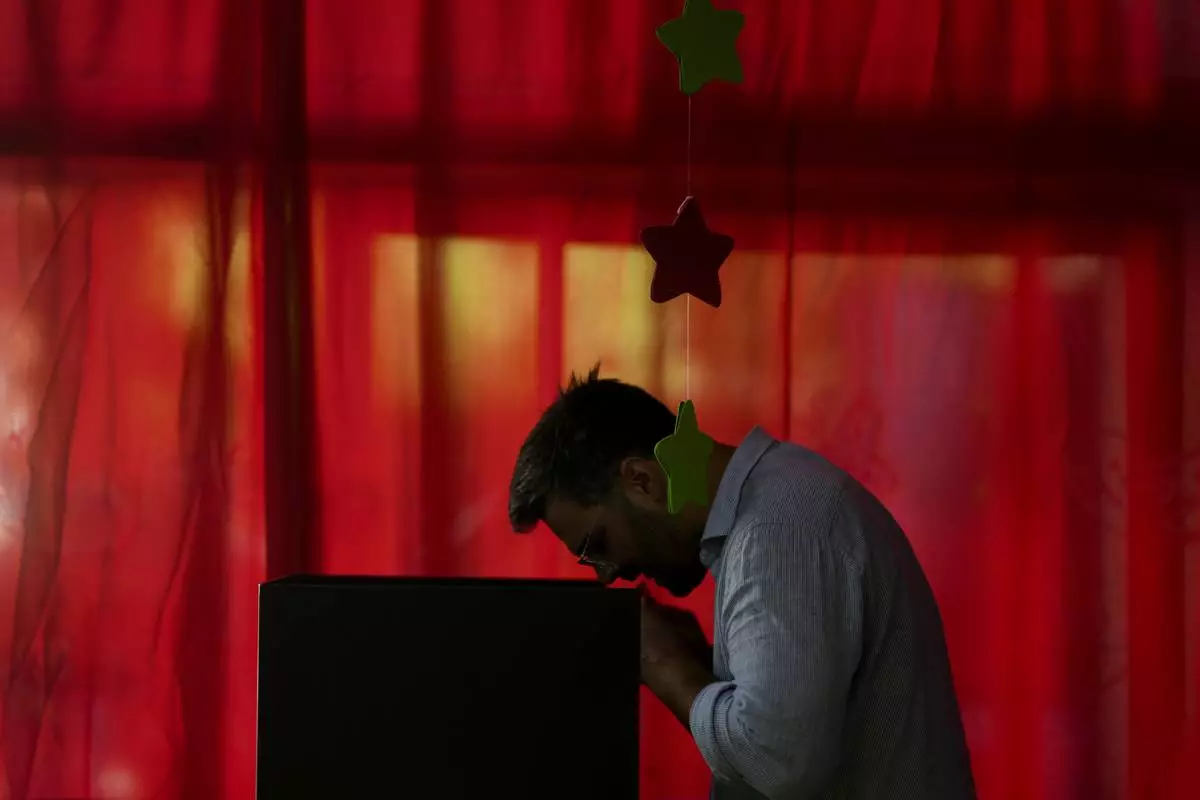
A voter chooses his preference at polling station in the presidential run-off election in Montevideo, Uruguay, Sunday, Nov. 24, 2024. (AP Photo/Natacha Pisarenko)
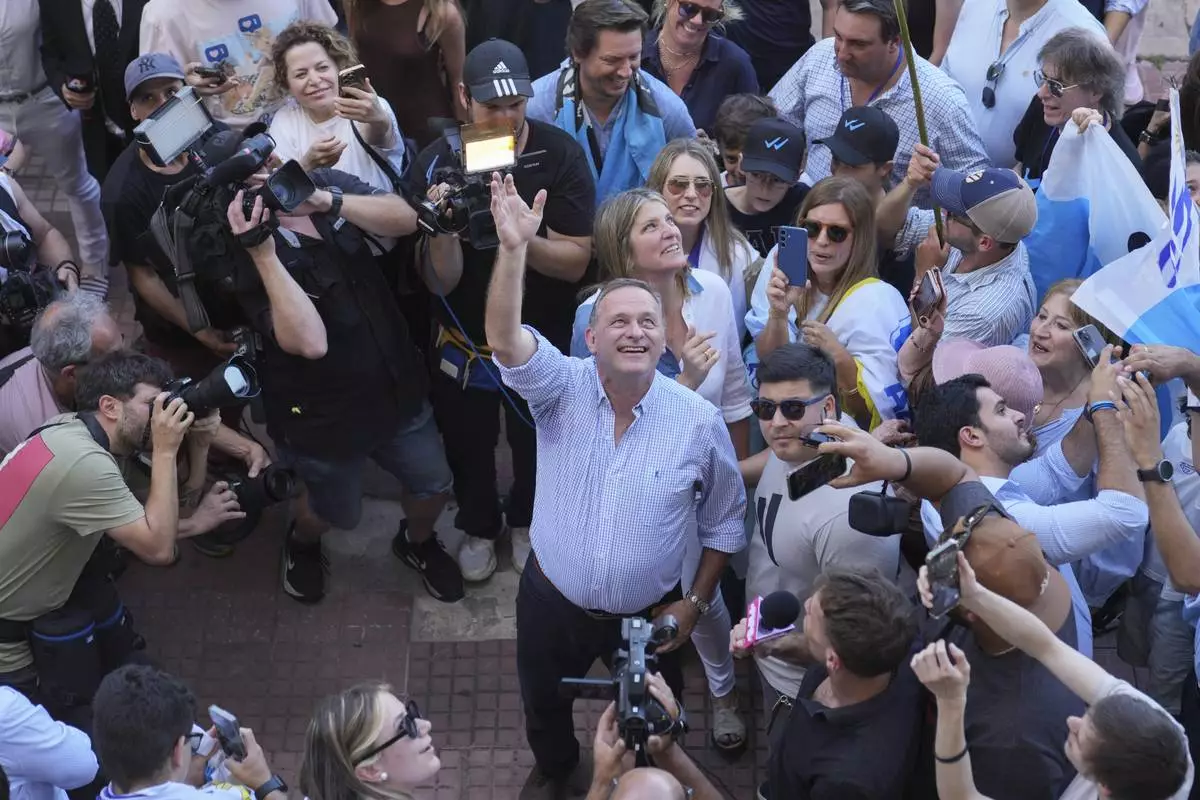
Alvaro Delgado, candidate for the ruling National Party, waves after voting in the presidential run-off election in Montevideo, Uruguay, Sunday, Nov. 24, 2024. (AP Photo/Natacha Pisarenko)
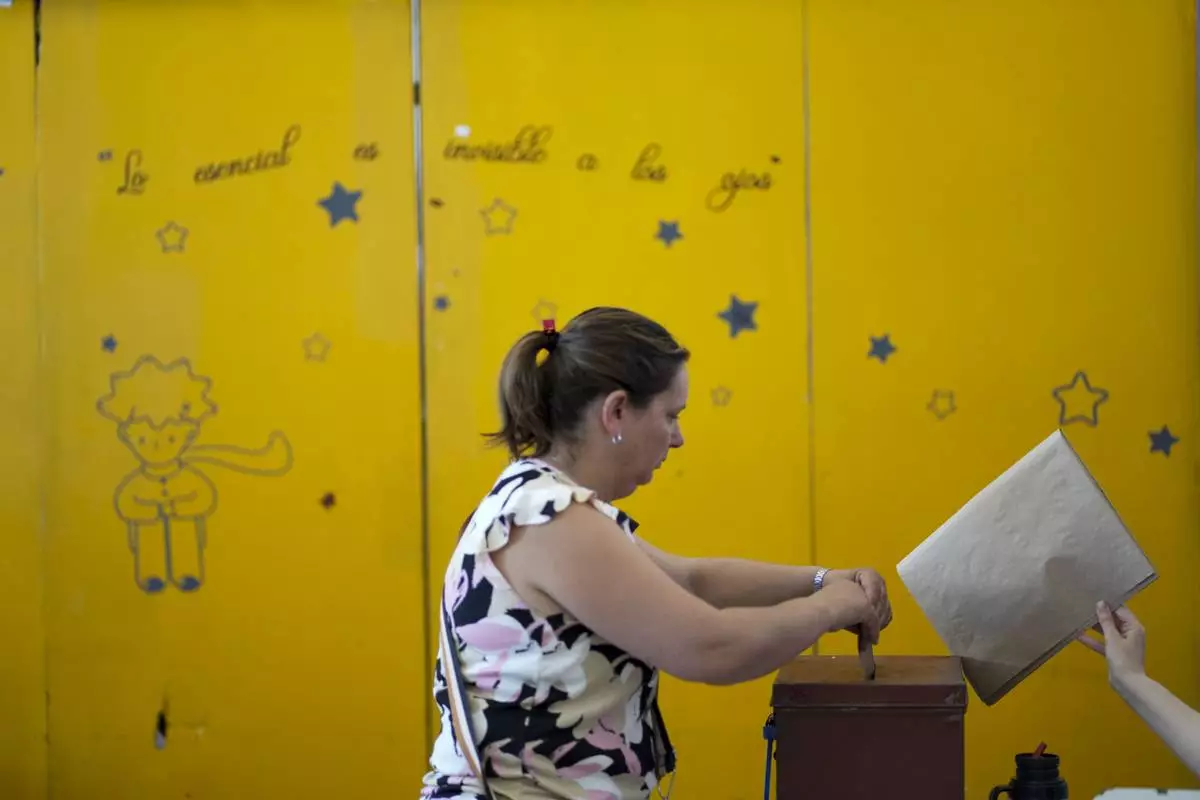
A woman votes in the presidential run-off election in Canelones, Uruguay, Sunday, Nov. 24, 2024. (AP Photo/Matilde Campodonico)
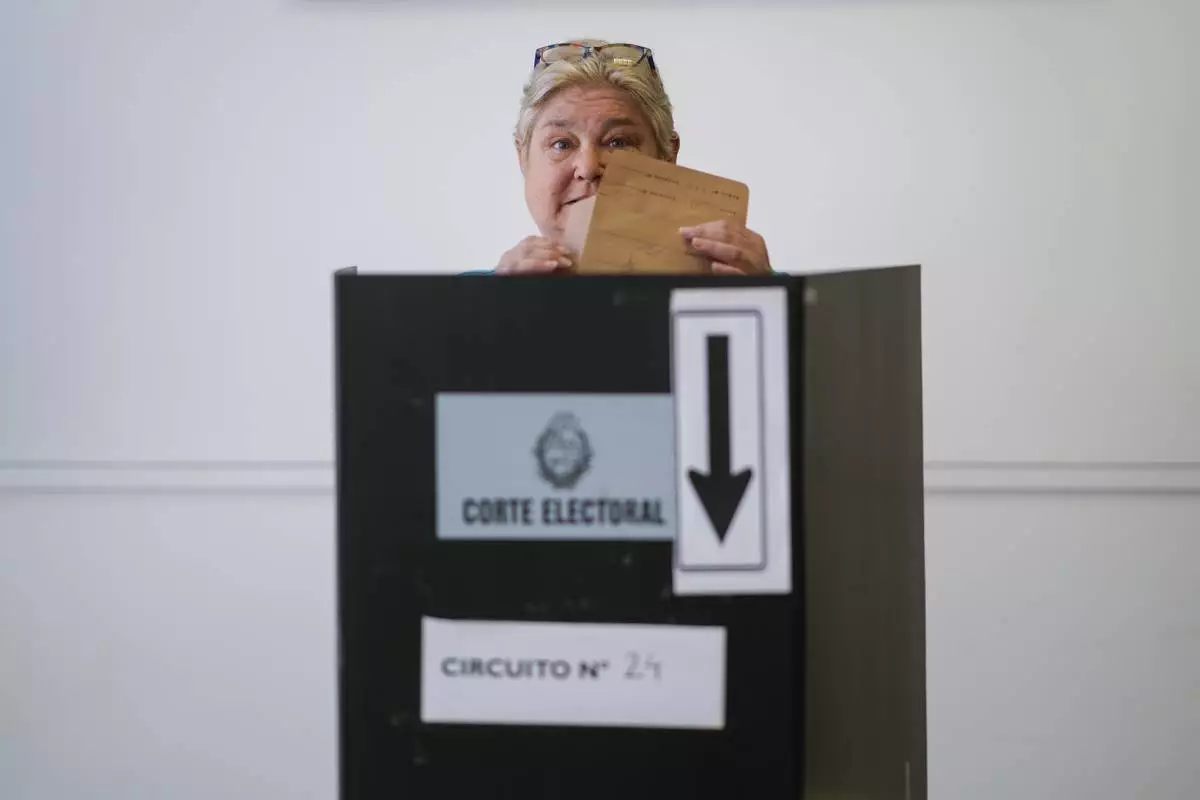
Yeni Varone, a nurse, casts her vote in the presidential run-off election in Montevideo, Uruguay, Sunday, Nov. 24, 2024. (AP Photo/Natacha Pisarenko)
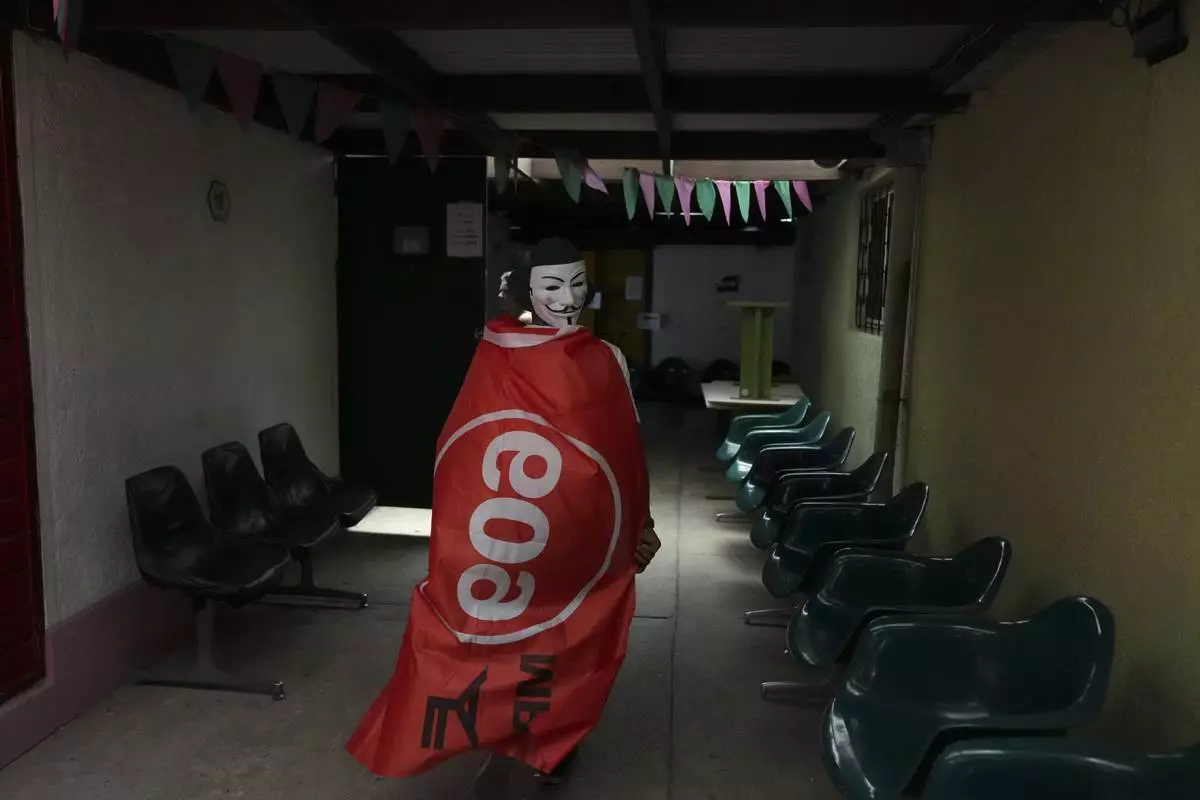
A voter wrapped in a flag of the Frente Amplio (Broad Front) arrives to a polling station to vote in the presidential run-off in Montevideo, Uruguay, Sunday, Nov. 24, 2024. (AP Photo/Matilde Campodonico)

A voter casts his ballot for the presidential run-off election in Canelones, Uruguay, Sunday, Nov. 24, 2024. (AP Photo/Matilde Campodonico)
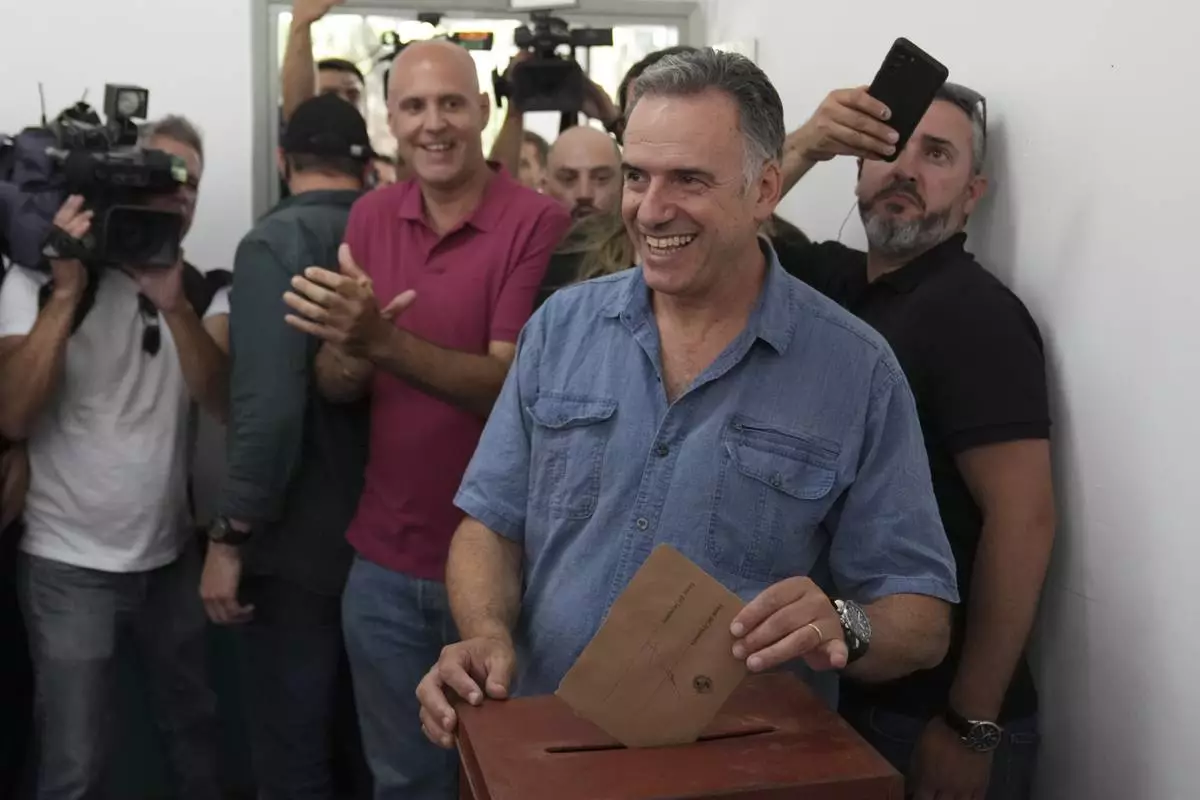
Yamandu Orsi, presidential candidate from the Frente Amplio (Broad Front), votes in the presidential run-off election in Canelones, Uruguay, Sunday, Nov. 24, 2024. (AP Photo/Matilde Campodonico)
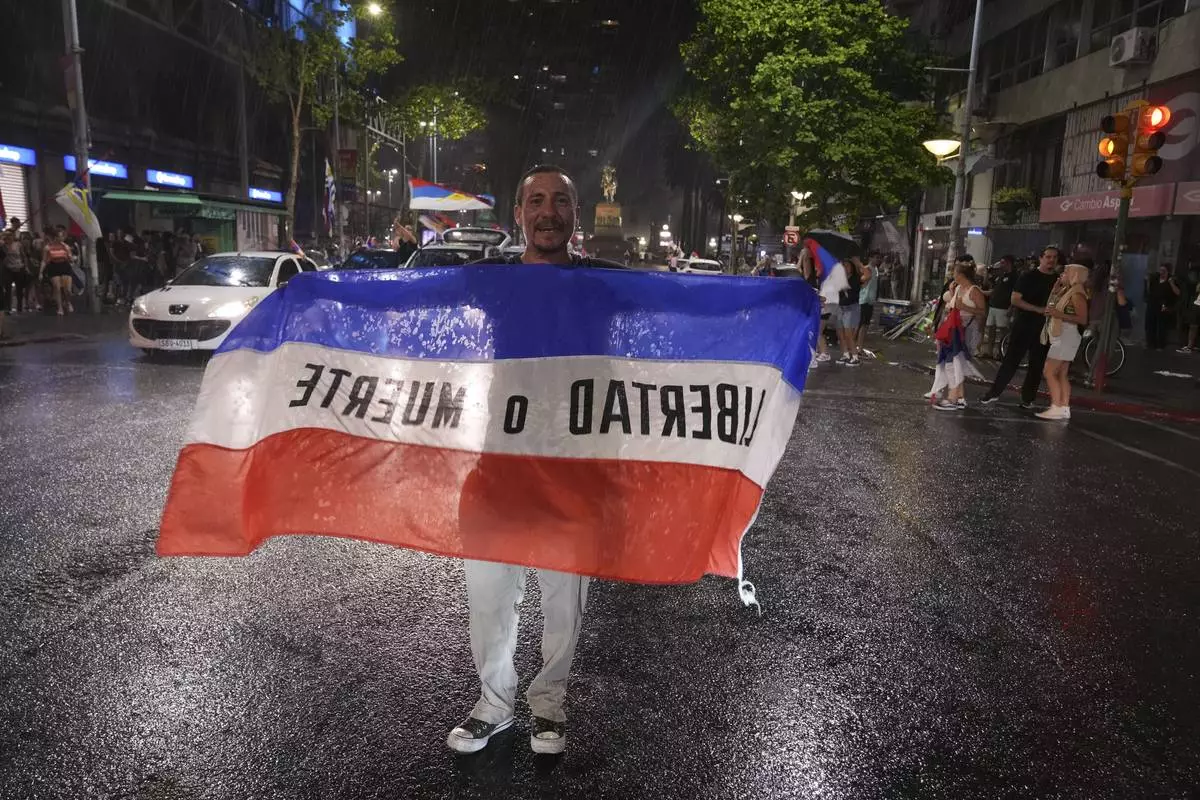
Supporters of the Broad Front (Frente Amplio) celebrate the victory of candidate Yamandú Orsi in the presidential run-off election in Montevideo, Uruguay, Sunday, Nov. 24, 2024. (AP Photo/Matilde Campodonico)
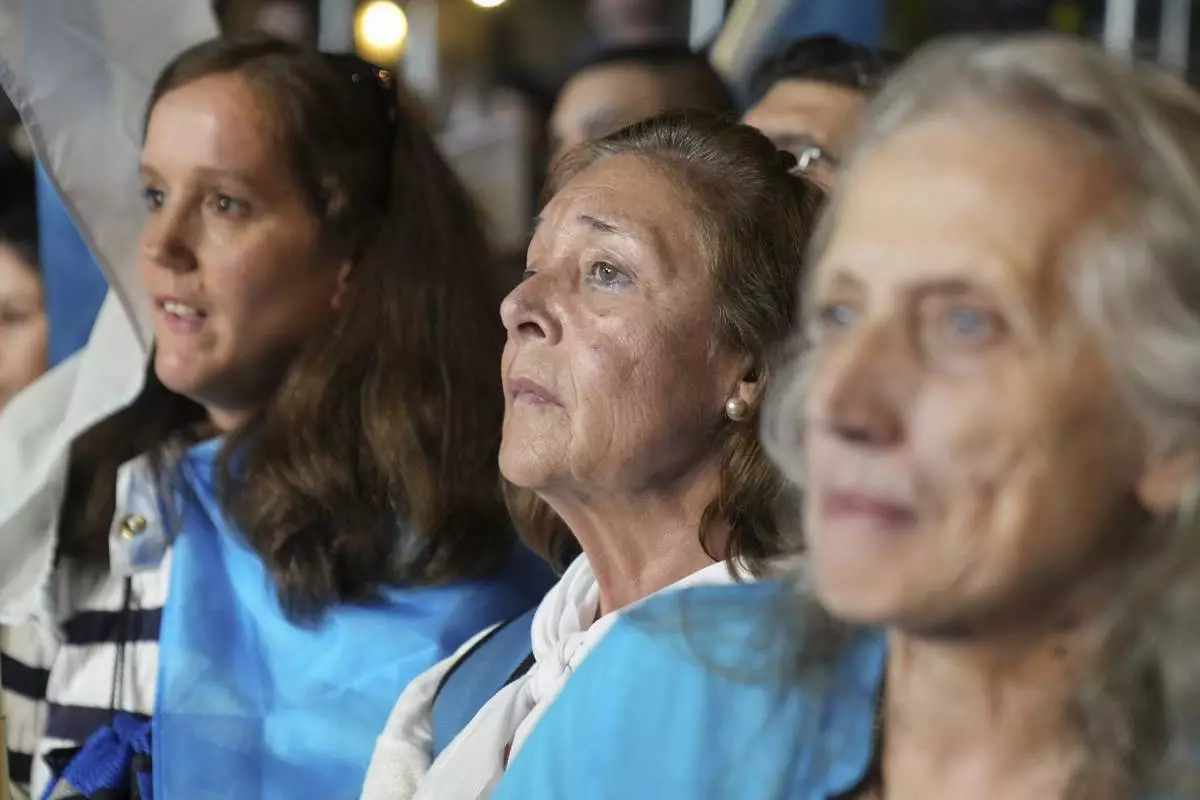
Supporters of Alvaro Delgado, presidential candidate for the ruling National Party, listen to early results from pollsters at the party's campaign night headquarters in Montevideo, Uruguay, after polls closed in the presidential run-off election, Sunday, Nov. 24, 2024. (AP Photo/Matilde Campodonico)
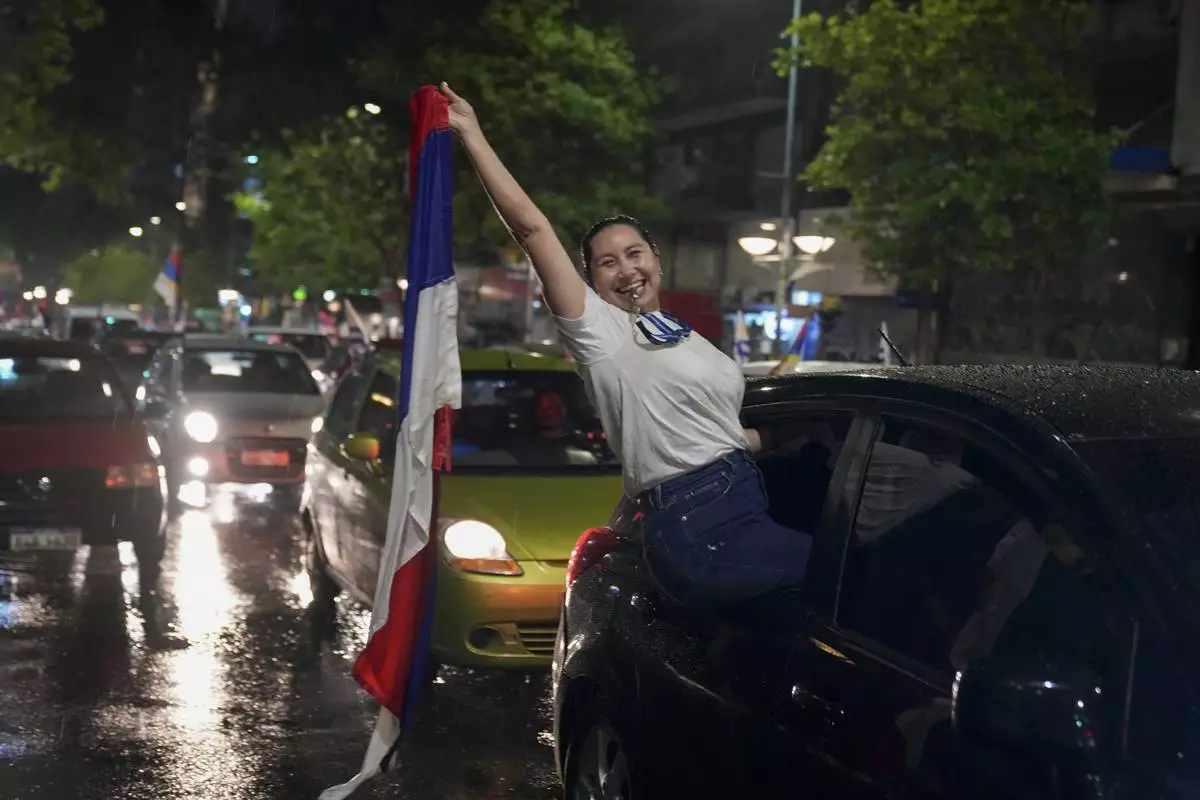
Supporters of the Broad Front (Frente Amplio) celebrate the victory of candidate Yamandú Orsi in the presidential run-off election in Montevideo, Uruguay, Sunday, Nov. 24, 2024. (AP Photo/Matilde Campodonico)
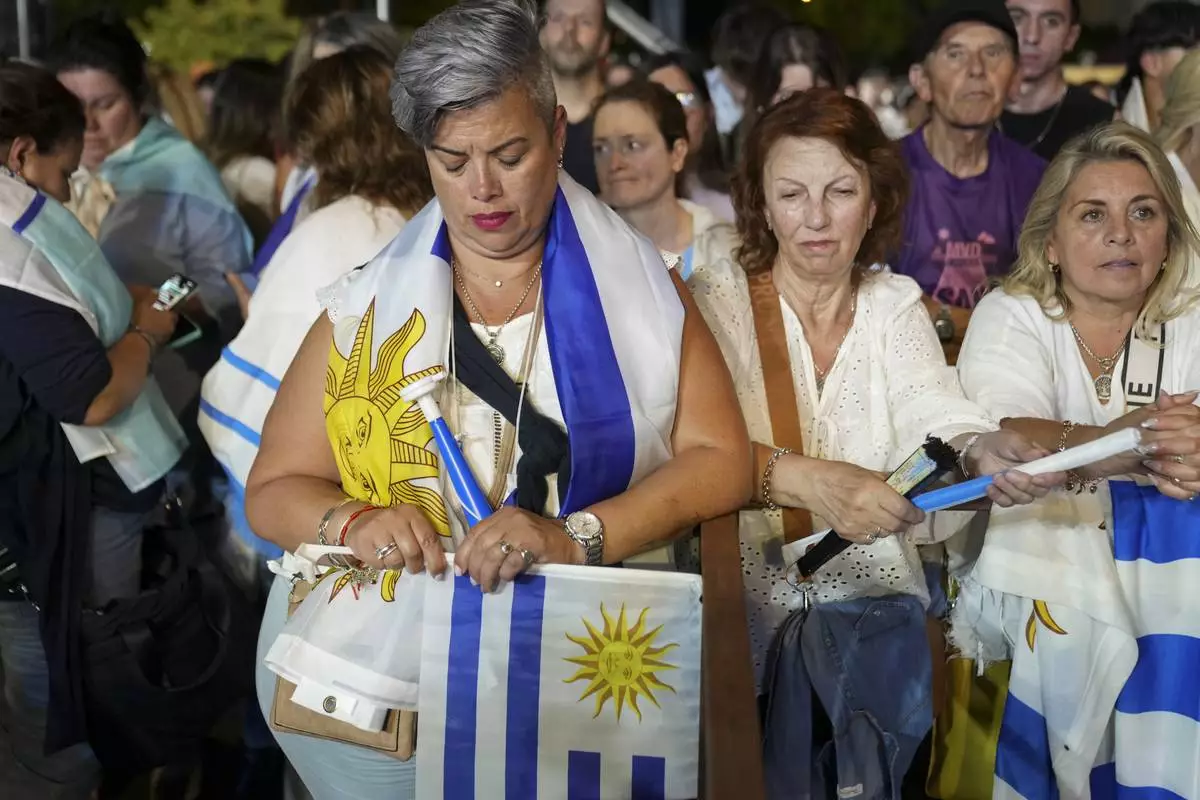
Supporters of Alvaro Delgado, presidential candidate for the ruling National Party, listen to early results from pollsters at the party's campaign night headquarters in Montevideo, Uruguay, after polls closed in the presidential run-off election, Sunday, Nov. 24, 2024. (AP Photo/Matilde Campodonico)
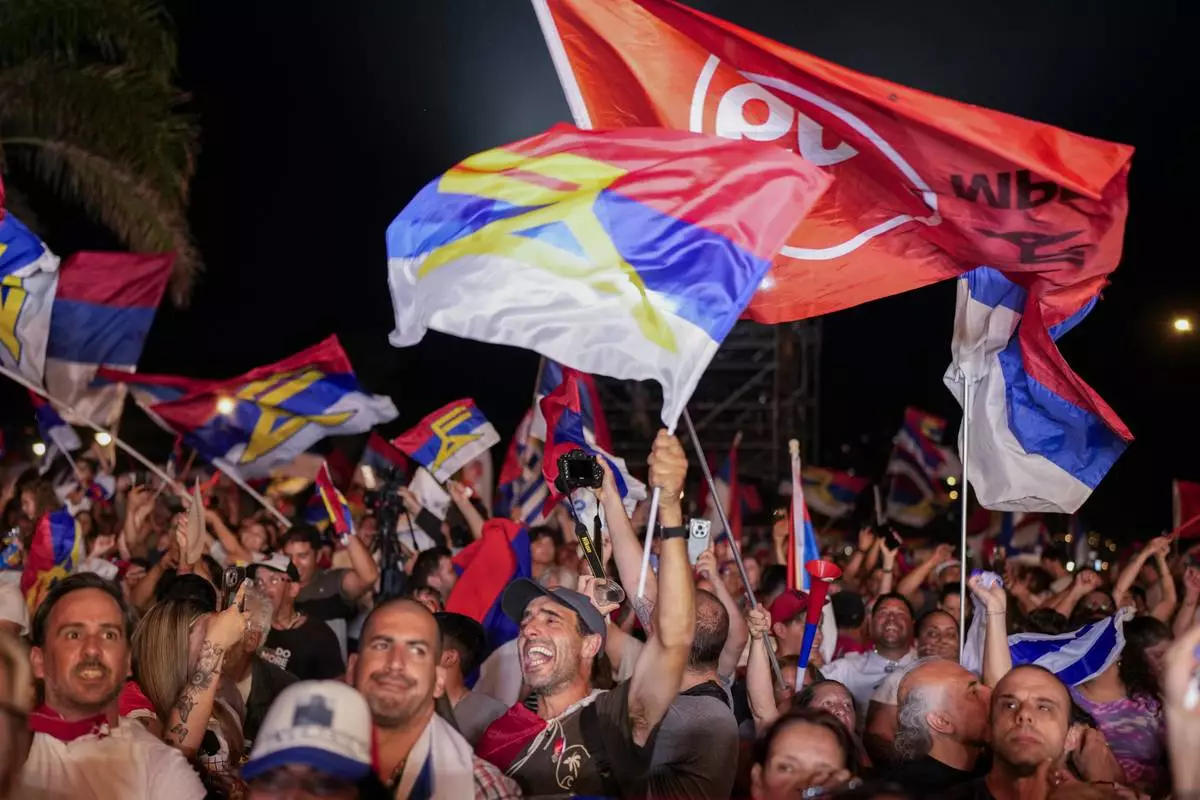
Supporters of Yamandu Orsi, candidate for the Broad Front (Frente Amplio), celebrate early results after polls closed in the presidential run-off election in Montevideo, Uruguay, Sunday, Nov. 24, 2024. (AP Photo/Natacha Pisarenko)
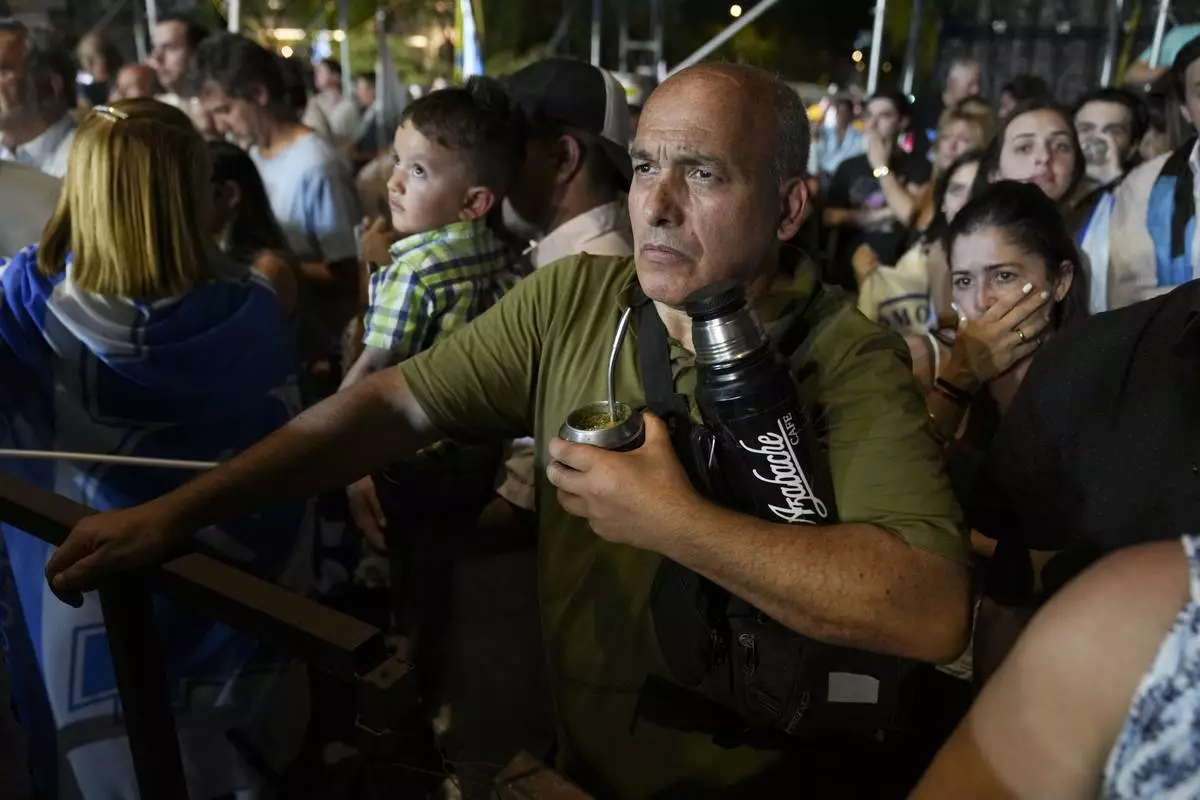
Supporters of Alvaro Delgado, presidential candidate for the ruling National Party, listen to early results from pollsters at the party's campaign night headquarters in Montevideo, Uruguay, after polls closed in the presidential run-off election, Sunday, Nov. 24, 2024. (AP Photo/Matilde Campodonico)
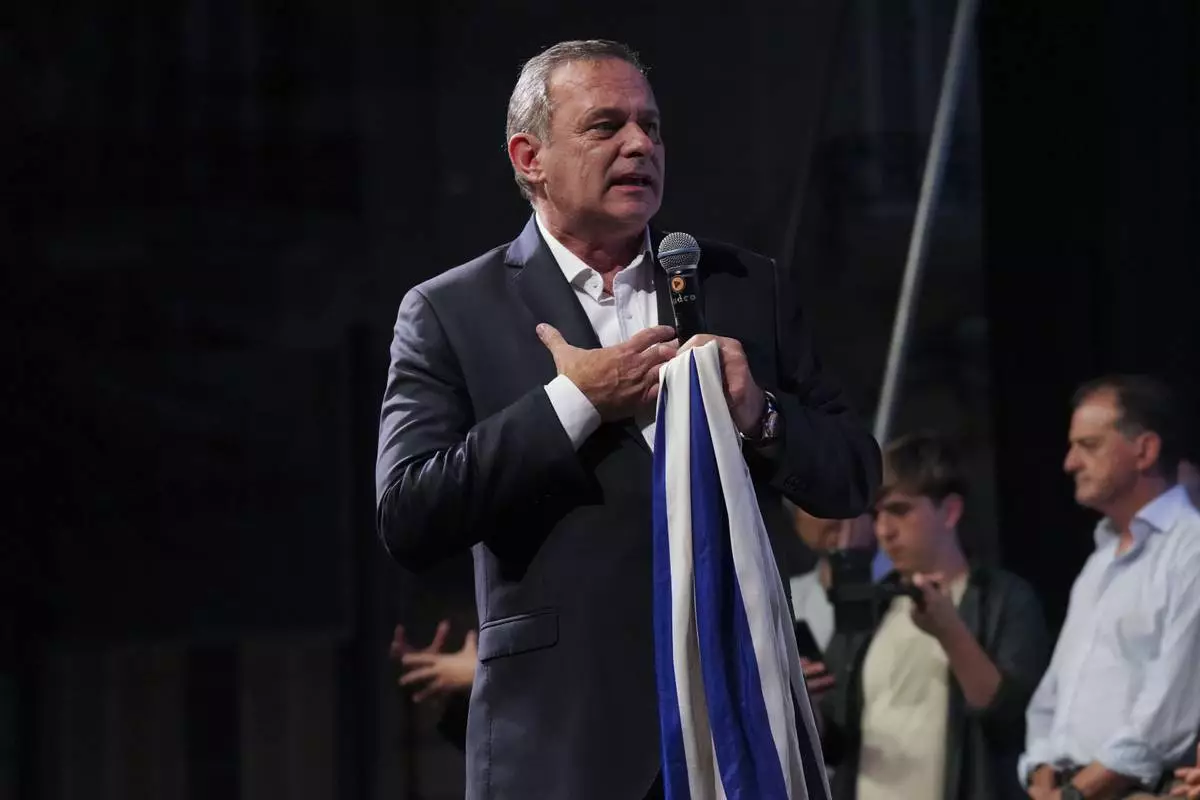
Alvaro Delgado, presidential candidate for the ruling National Party, concedes defeat in the presidential run-off election in Montevideo, Uruguay, Sunday, Nov. 24, 2024. (AP Photo/Matilde Campodonico)
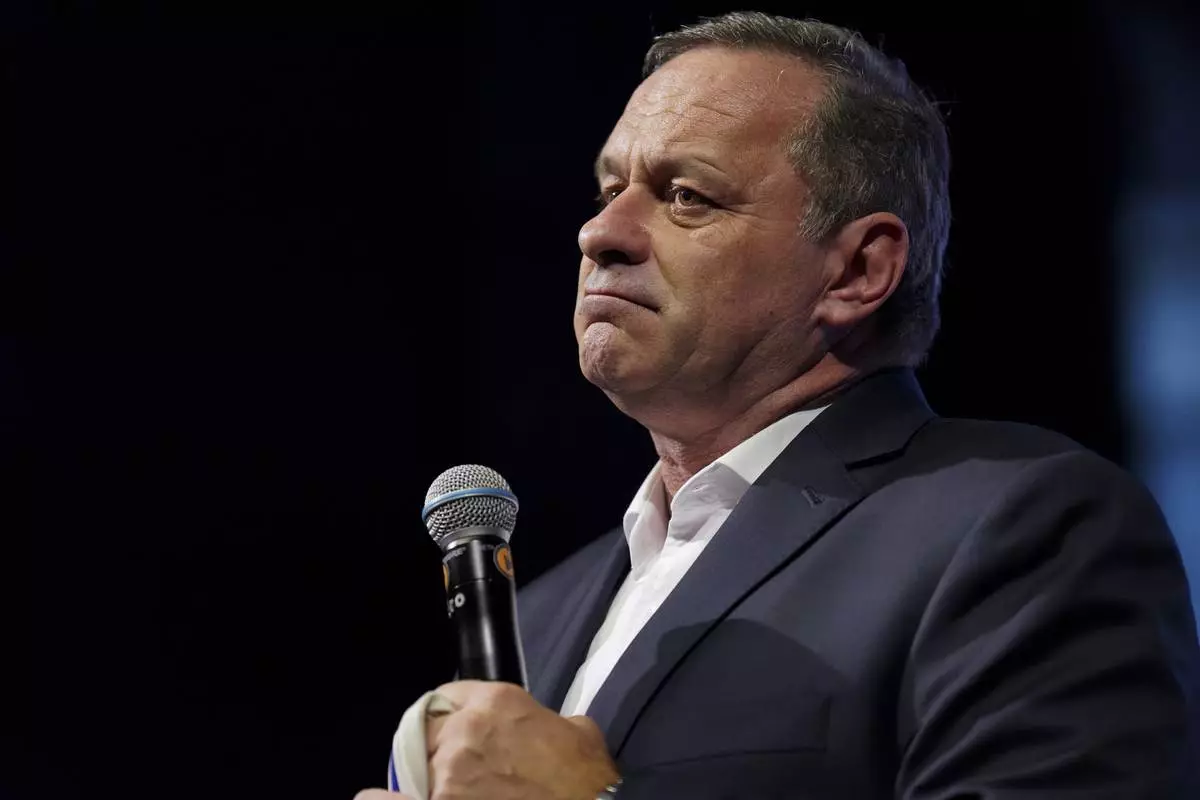
Alvaro Delgado, presidential candidate for the ruling National Party, concedes defeat in the presidential run-off election in Montevideo, Uruguay, Sunday, Nov. 24, 2024. (AP Photo/Matilde Campodonico)
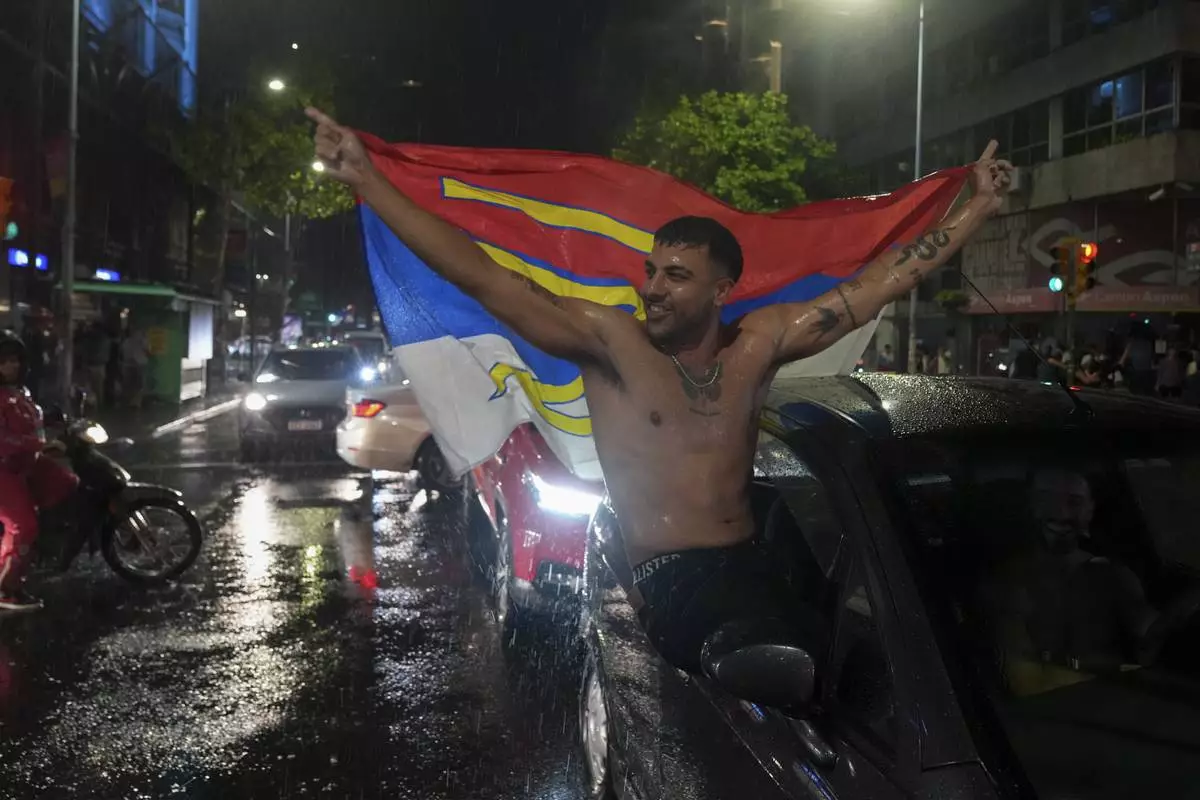
Supporters of the Broad Front (Frente Amplio) celebrate the victory of candidate Yamandú Orsi in the presidential run-off election in Montevideo, Uruguay, Sunday, Nov. 24, 2024. (AP Photo/Matilde Campodonico)
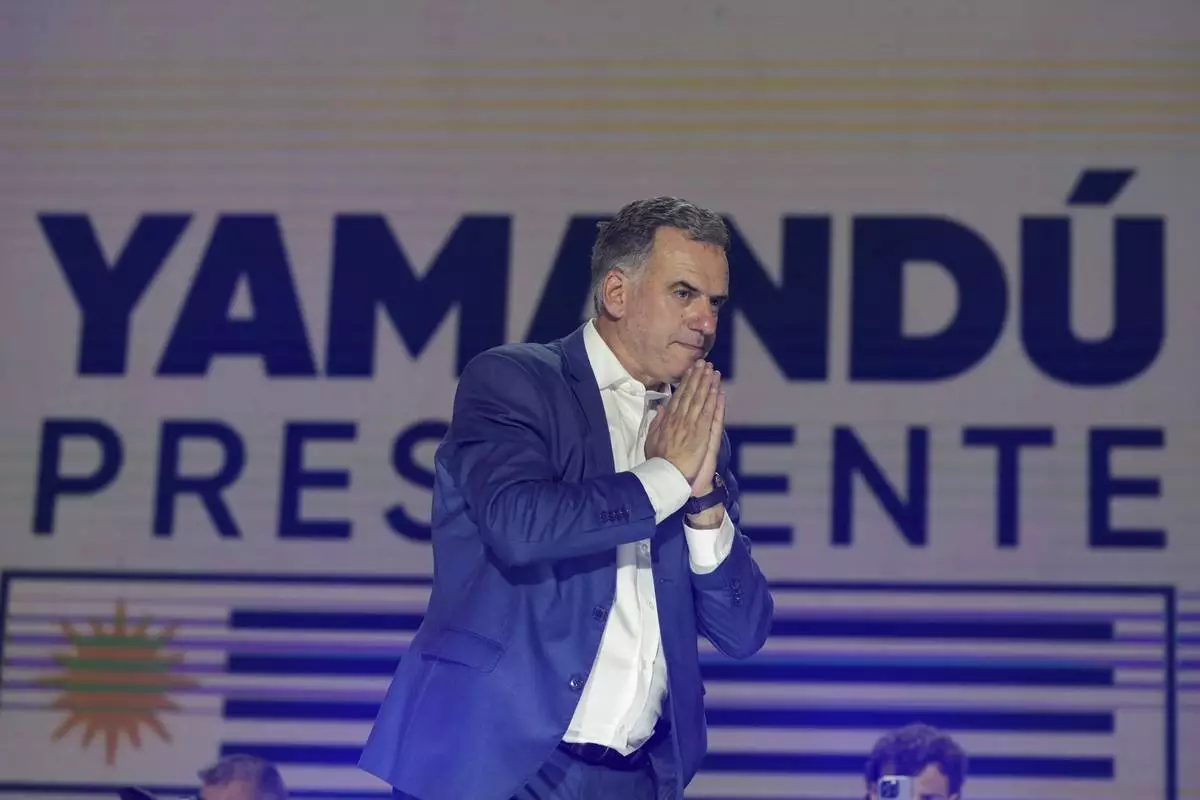
Yamandu Orsi, candidate for the Broad Front (Frente Amplio), addresses supporters after winning the presidential run-off election in Montevideo, Uruguay, Sunday, Nov. 24, 2024. (AP Photo/Natacha Pisarenko)
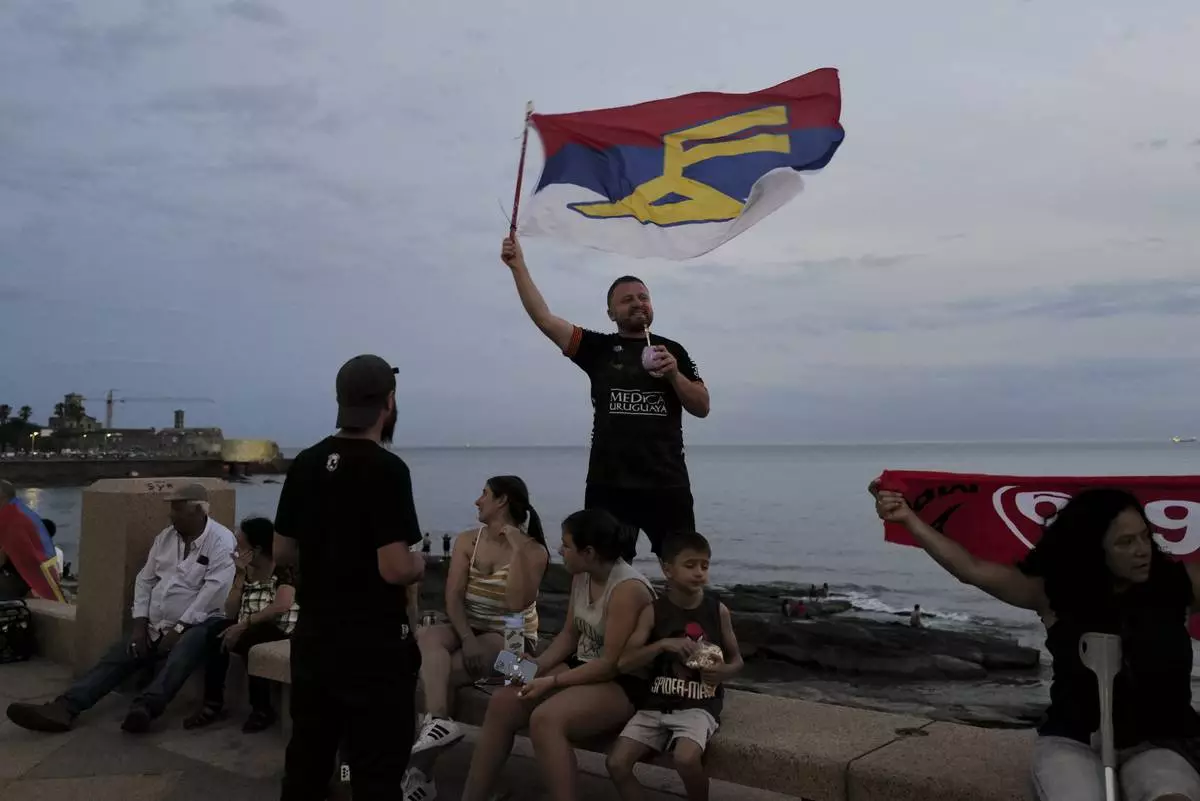
Supporters of the Broad Front (Frente Amplio) celebrate the victory of candidate Yamandú Orsi in the presidential run-off election in Montevideo, Uruguay, Sunday, Nov. 24, 2024. (AP Photo/Jon Orbach)

Yamandu Orsi, candidate for the Broad Front (Frente Amplio), and running mate Carolina Cosse, left, celebrate their victory in the presidential run-off election in Montevideo, Uruguay, Sunday, Nov. 24, 2024. (AP Photo/Natacha Pisarenko)
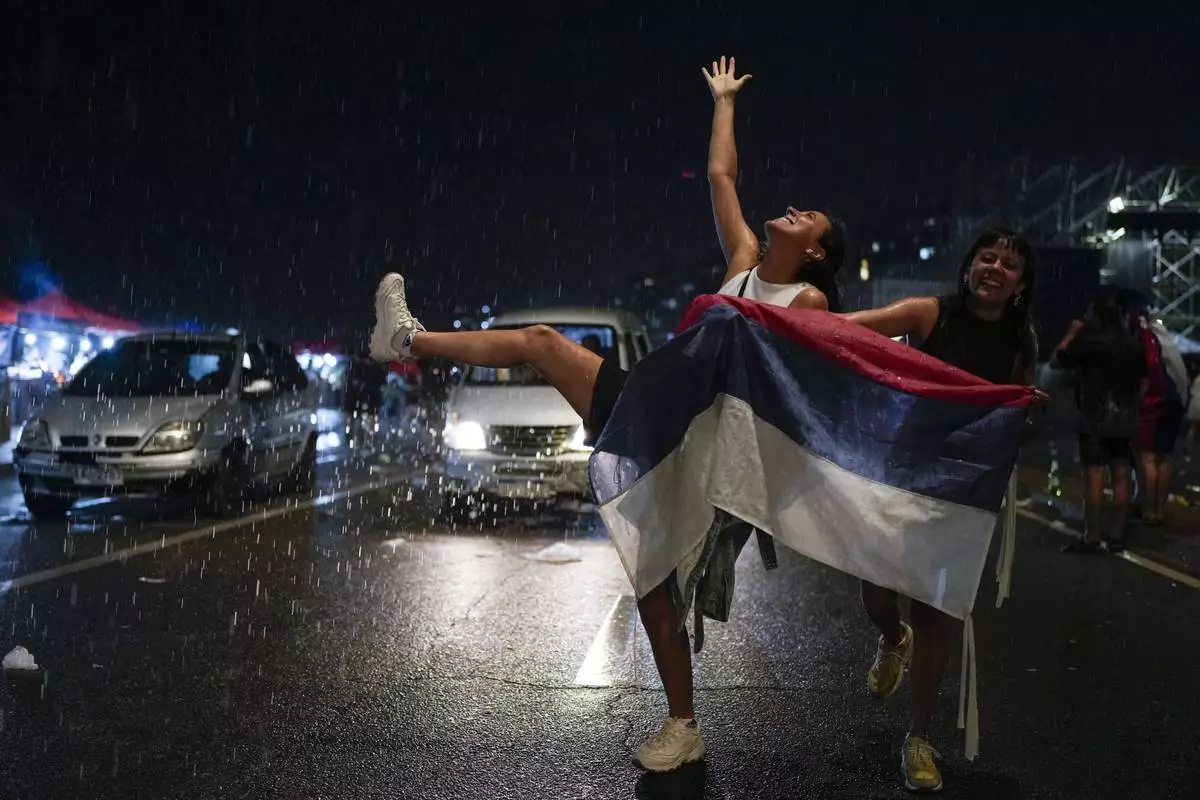
Supporters of the Frente Amplio (Broad Front) celebrate the victory of candidate Yamandú Orsi in the presidential run-off election in Montevideo, Uruguay, Sunday, Nov. 24, 2024. (AP Photo/Natacha Pisarenko)

Yamandu Orsi, candidate for the Broad Front (Frente Amplio) and running mate Carolina Cosse, right, celebrate after polls closed in the presidential run-off election in Montevideo, Uruguay, Sunday, Nov. 24, 2024. (AP Photo/Natacha Pisarenko)
SADO, Japan (AP) — South Korea paid tribute to wartime Korean forced laborers at Japan’s Sado Island Gold Mines in a memorial ceremony on Monday, a day after boycotting a similar event organized by Japan, as tensions over historical atrocities continue to impact relations between the two sides.
Monday's ceremony at a former dormitory near the 16th century Sado mines, which were listed this summer as a UNESCO World Heritage site, was organized by South Korea’s Foreign Ministry and attended by nine families of Korean wartime laborers, the country’s ambassador to Japan and other officials.
Japan on Sunday held a memorial service for all workers at the Sado mines, including Koreans. It thanked them for their contributions at the mines but did not acknowledge their forced labor or issue an apology.
At the Korean-sponsored memorial on Monday, participants in dark suits observed a moment of silence and offered white chrysanthemums in honor of the South Korean laborers, along with offerings such as dried fish, sliced apple and pears.
In a short speech, South Korea's Ambassador to Japan Park Choel-hee offered his condolences to the forced laborers and their families, expressing hopes that the memorial would bring comfort to families. He said South Korea and Japan should both make efforts to ensure that the painful wartime history is remembered.
“We will never forget the tears and sacrifices of the Korean workers behind the history of the Sado mines,” Park said.
“I sincerely hope that today will be a day of remembrance for all the Korean workers who suffered indescribable pain under harsh conditions, and that this memorial service will bring comfort to the souls of the deceased Korean workers and their bereaved families,” Park added.
At the mines, about 1,500 Koreans were forced to labor under abusive and brutal conditions during World War II, historians say.
Sunday’s ceremony, which was supposed to further mend wounds, renewed tensions between the two sides. South Korea announced Saturday its decision to not attend the Japanese-organized ceremony, citing unspecified disagreements with Tokyo over the event.
There was speculation that the South Korean boycott was related to parliamentary vice minister Akiko Ikuina's attendance at Sunday’s ceremony.
Ikuina reportedly visited Tokyo’s controversial Yasukuni Shrine in August 2022, weeks after she was elected as a lawmaker. Japan’s neighbors view Yasukuni, which commemorates 2.5 million war dead, including war criminals, as a symbol of Japan’s past militarism.
The Sado mines were registered as a UNESCO cultural heritage site in July after Japan agreed to include an exhibit on the conditions of Korean forced laborers and to hold a memorial service annually, after repeated protests from the South Korean government.
Signs, including one at the site where South Koreans held their ceremony, have been erected indicating former sites of Korean laborers’ dormitories. A city-operated museum in the area also added a section about Korean laborers, but a private museum attached to the main UNESCO site doesn’t mention them at all.
The site of South Korea's memorial was the former Fourth Souai Dormitory, one of four dorms for Korean laborers without families. A newly erected sign there reads, “Workers from the Korean Peninsula lived here during the wartime.”
On Saturday, the families visited a former housing site where Korean laborers lived. They also briefly saw the city-run museum and an exhibit on the Korean laborers as they listened to explanations through a translator.
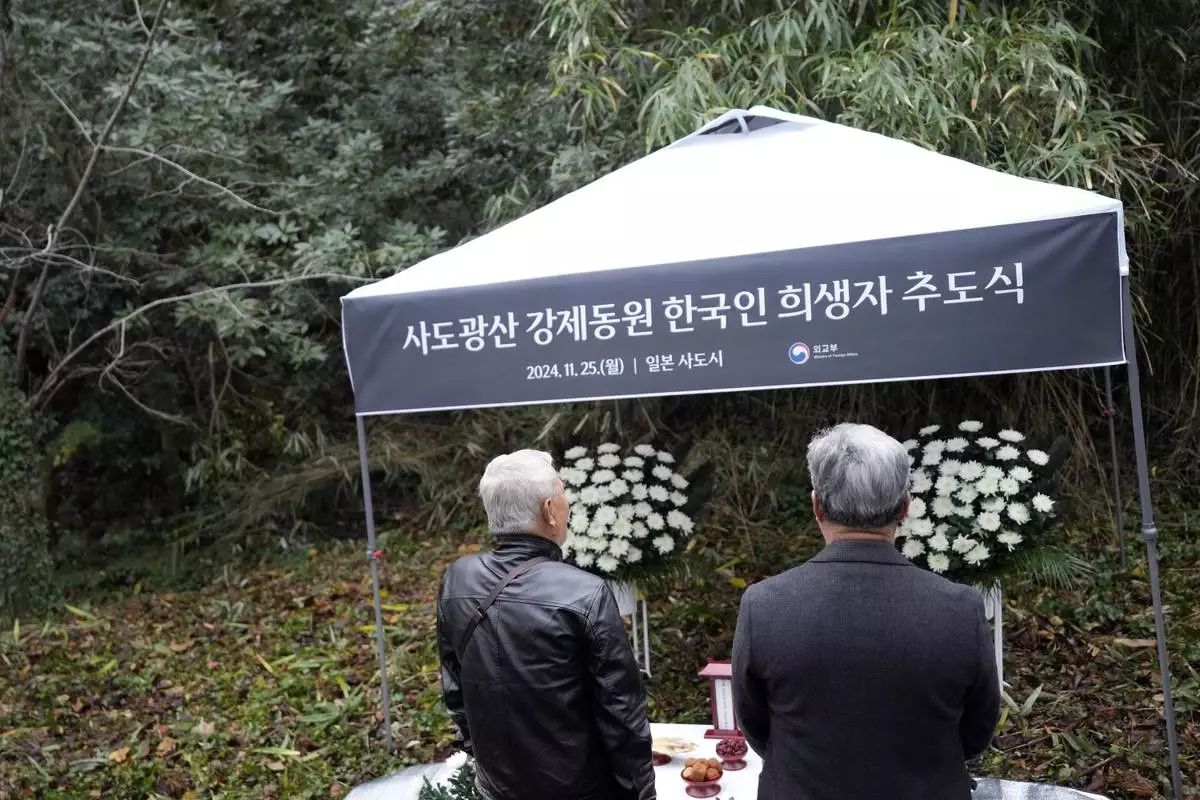
Relatives of Korean victims and South Korean officials offer a prayer during a memorial service at the site of former Fourth Souai Dormitory for the mine workers from the Korean Peninsula, in Sado, Niigata prefecture, Japan, Monday, Nov. 25, 2024, a day after boycotting a memorial organized by Japanese officials. The black banner reads "A memorial service for Korean forced laborer victims at Sado Mine." (AP Photo/Eugene Hoshiko)
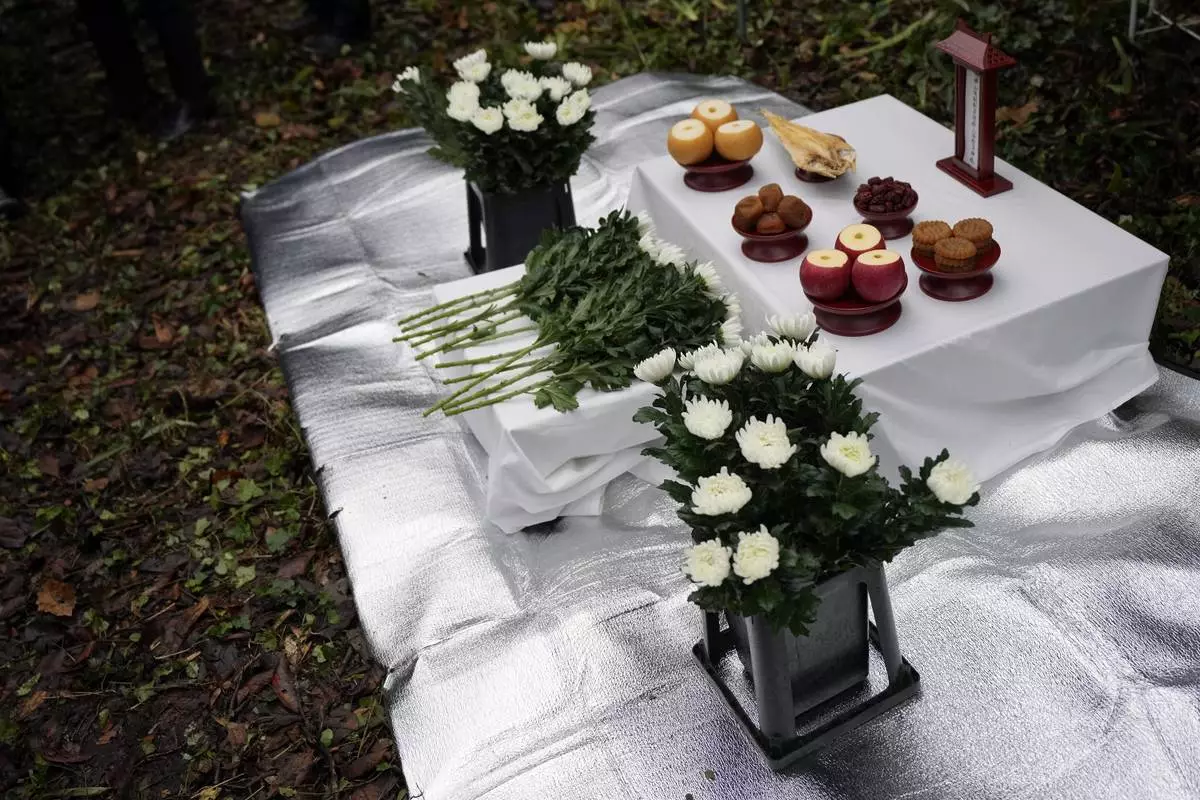
Offering by the relatives of Korean victims and South Korean officials are seen at an alter after a memorial service at the site of former Fourth Souai Dormitory for the mine workers from the Korean Peninsula, in Sado, Niigata prefecture, Japan, Monday, Nov. 25, 2024, a day after boycotting a memorial organized by Japanese officials. (AP Photo/Eugene Hoshiko)
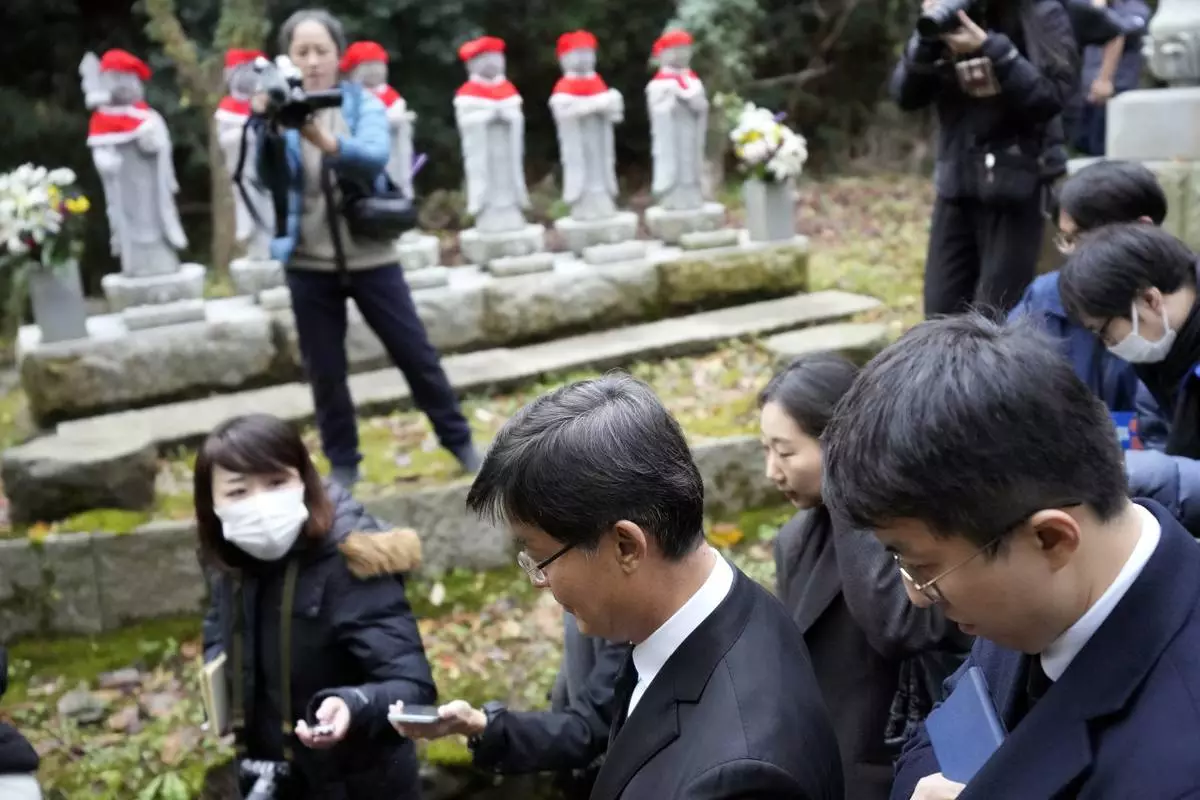
South Korean Ambassador to Japan Park Cheol-hee, bottom left, leaves after a memorial service with the relatives of Korean victims and South Korean officials at the site of former Fourth Souai Dormitory for the mine workers from the Korean Peninsula, in Sado, Niigata prefecture, Japan, Monday, Nov. 25, 2024, a day after boycotting a memorial organized by Japanese officials. (AP Photo/Eugene Hoshiko)
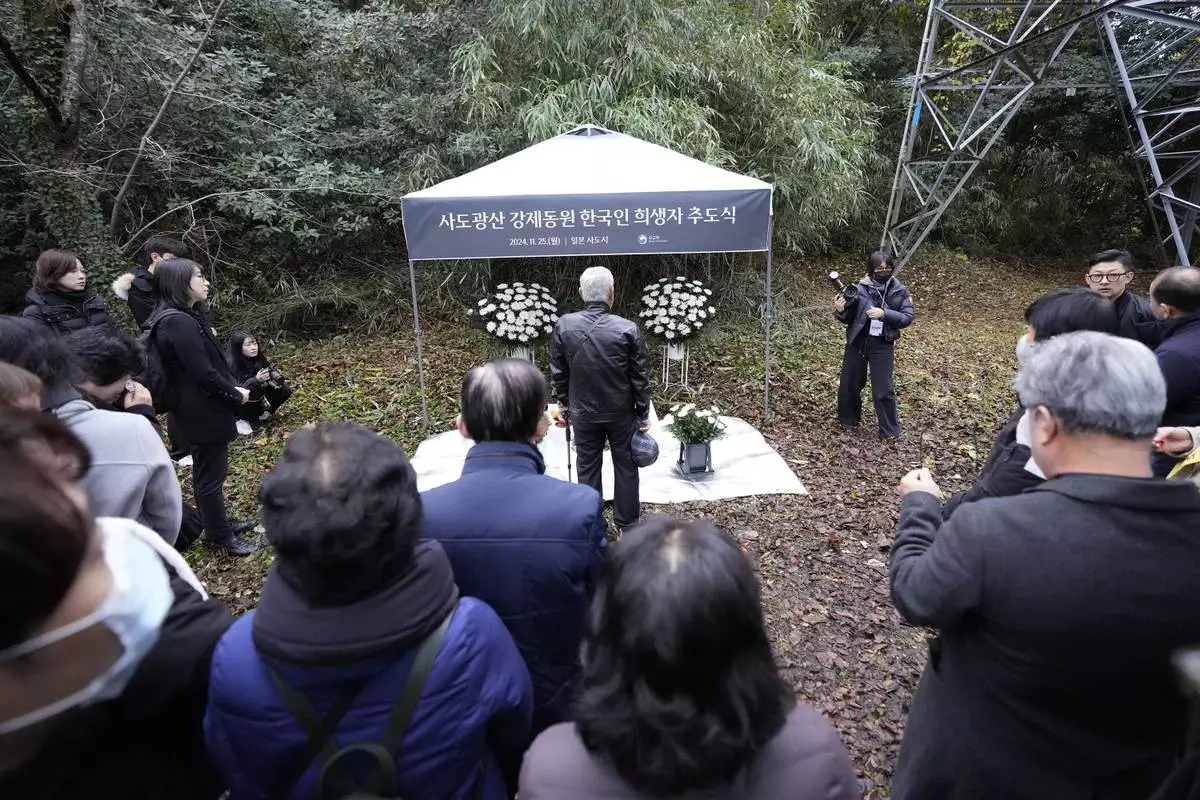
Relatives of Korean victims and South Korean officials offer a prayer during a memorial service at the site of former Fourth Souai Dormitory for the mine workers from the Korean Peninsula, in Sado, Niigata prefecture, Japan, Monday, Nov. 25, 2024, a day after boycotting a memorial organized by Japanese officials. (AP Photo/Eugene Hoshiko)
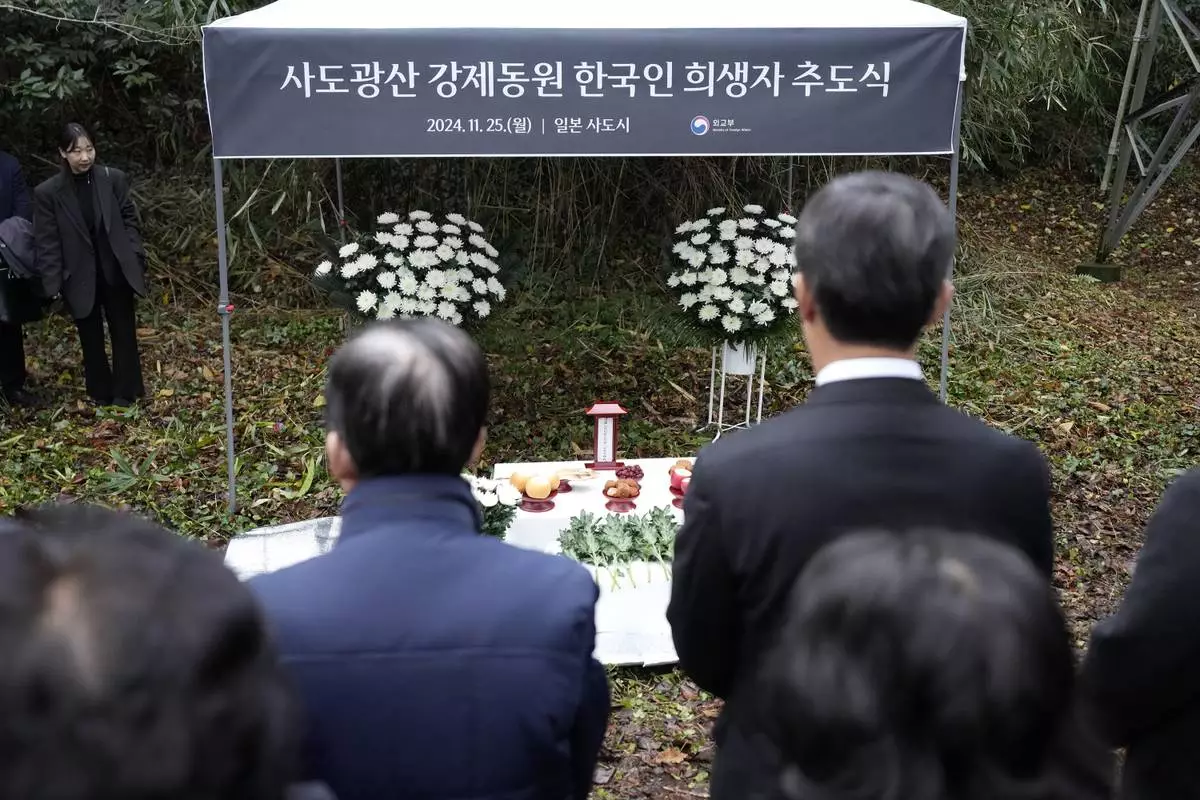
Relatives of Korean victims and South Korean officials offer a prayer during a memorial service at the site of former Fourth Souai Dormitory for the mine workers from the Korean Peninsula, in Sado, Niigata prefecture, Japan, Monday, Nov. 25, 2024, a day after boycotting a memorial organized by Japanese officials. The black banner reads "A memorial service for Korean forced laborer victims at Sado Mine." (AP Photo/Eugene Hoshiko)
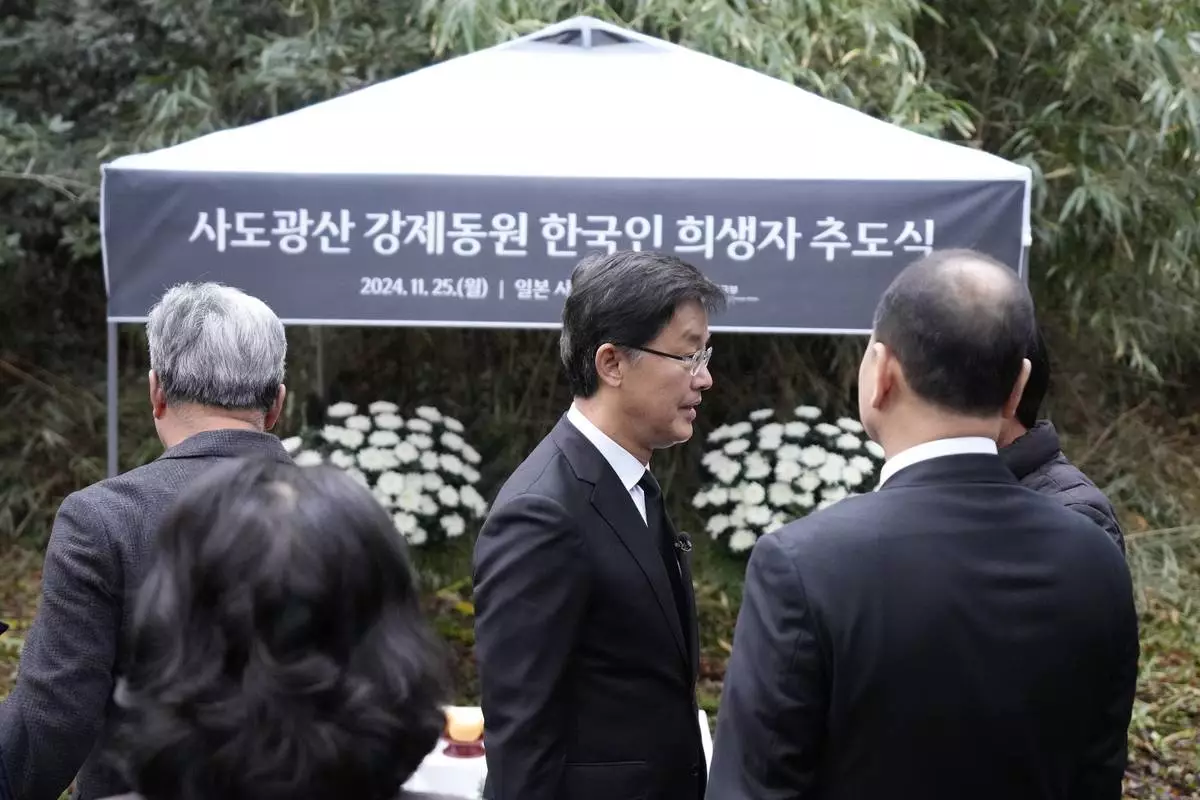
South Korean Ambassador to Japan Park Cheol-hee, center, speaks with the relatives of Korean victims and South Korean officials at the site of former Fourth Souai Dormitory for the mine workers from the Korean Peninsula, after a memorial service in Sado, Niigata prefecture, Japan, Monday, Nov. 25, 2024, a day after boycotting a memorial organized by Japanese officials. The black banner reads "A memorial service for Korean forced laborer victims at Sado Mine." (AP Photo/Eugene Hoshiko)
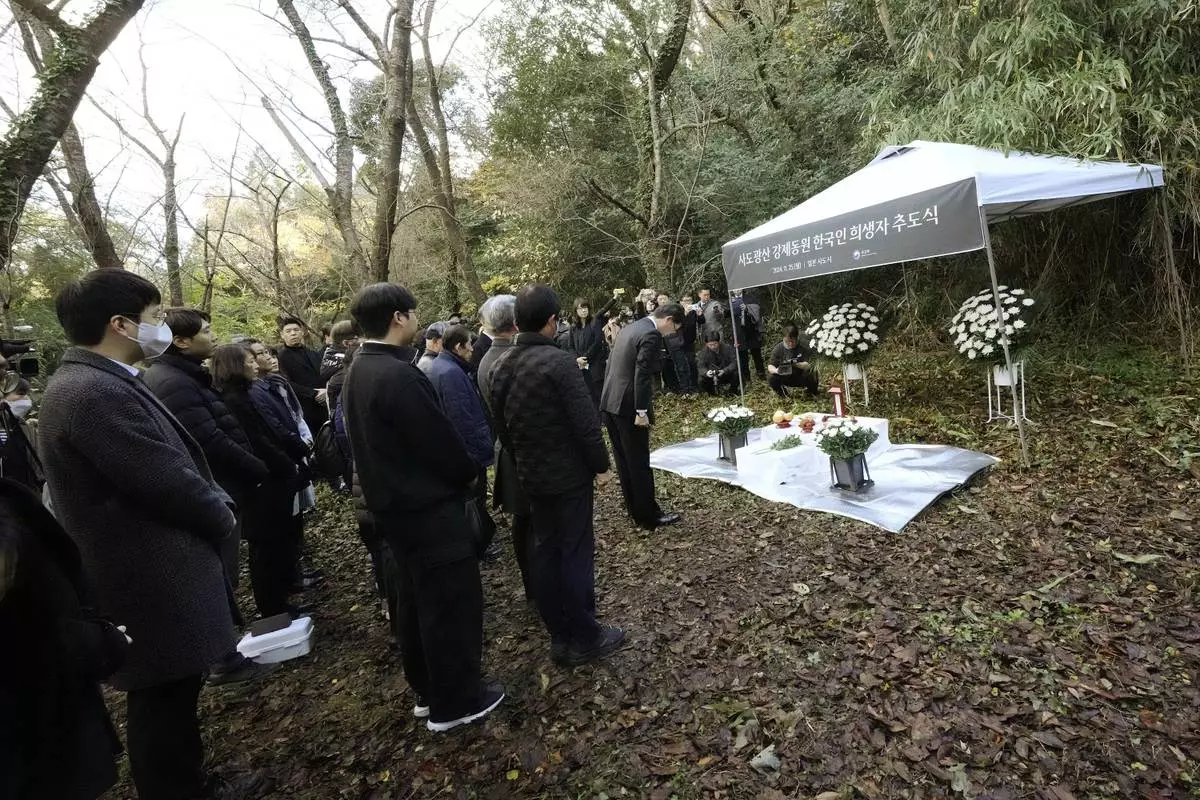
South Korean Ambassador to Japan Park Cheol-hee, right, bows to an altar as the relatives of Korean victims and South Korean officials during a memorial service at the site of former Fourth Souai Dormitory for the mine workers from the Korean Peninsula, in Sado, Niigata prefecture, Japan, Monday, Nov. 25, 2024. (AP Photo/Eugene Hoshiko)
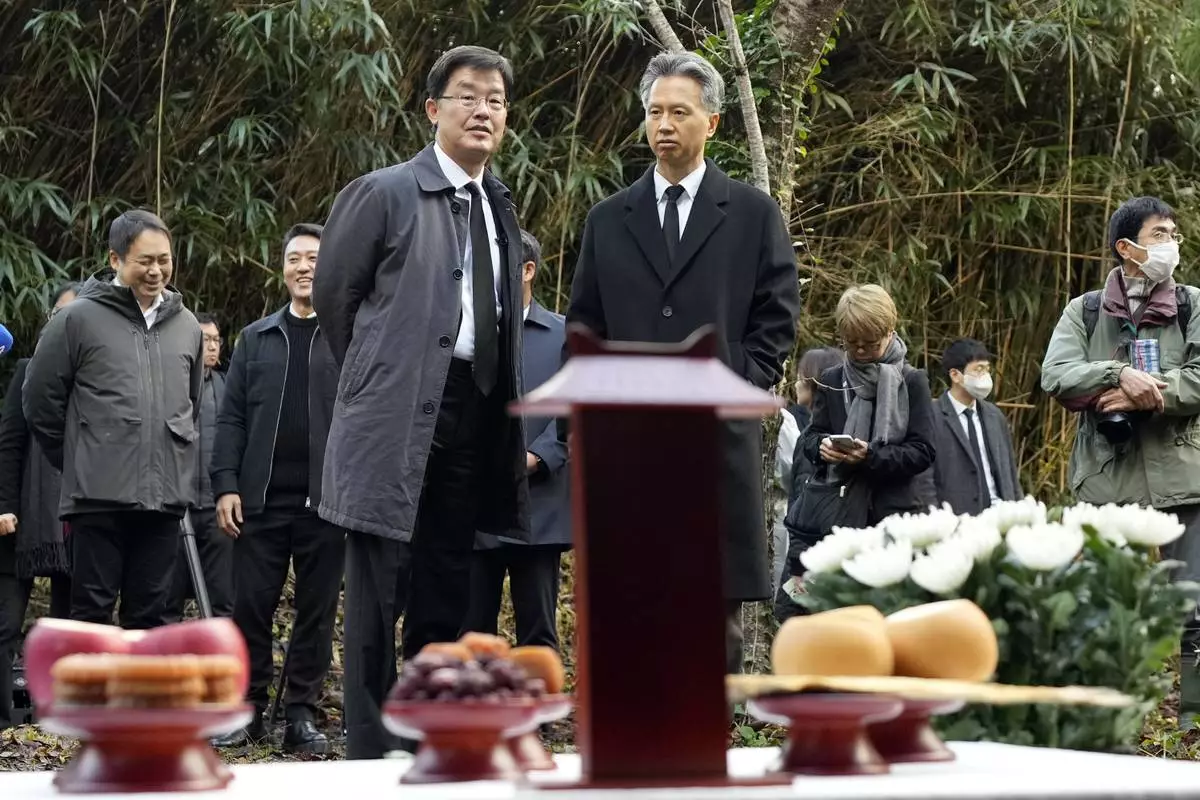
South Korean Ambassador to Japan Park Cheol-hee, front left, looks at a memorial service at the site of former Fourth Souai Dormitory for the mine workers from the Korean Peninsula, in Sado, Niigata prefecture, Japan, Monday, Nov. 25, 2024. (AP Photo/Eugene Hoshiko)
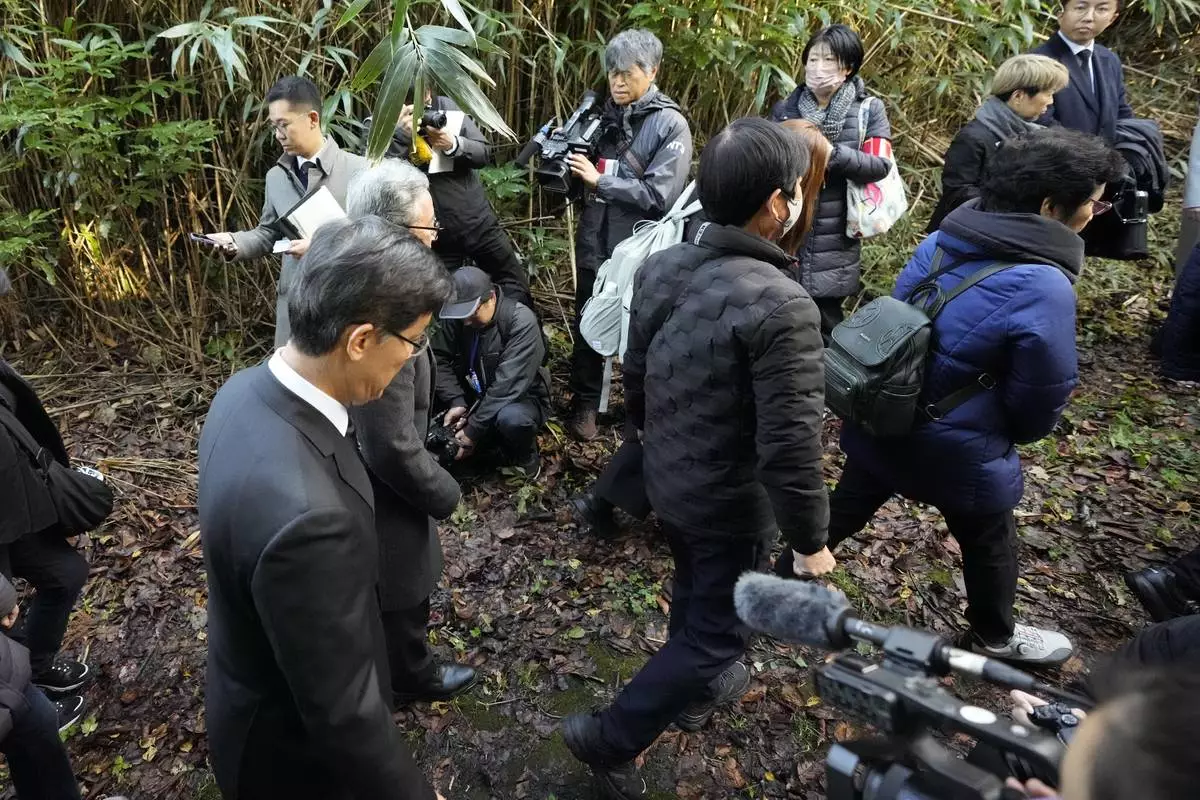
South Korean Ambassador to Japan Park Cheol-hee, left, walks with the relatives of Korean victims and South Korean officials to hold a memorial service at the site of former Fourth Souai Dormitory for the mine workers from the Korean Peninsula, in Sado, Niigata prefecture, Japan, Monday, Nov. 25, 2024, after boycotting a memorial organized by Japanese officials. (AP Photo/Eugene Hoshiko)
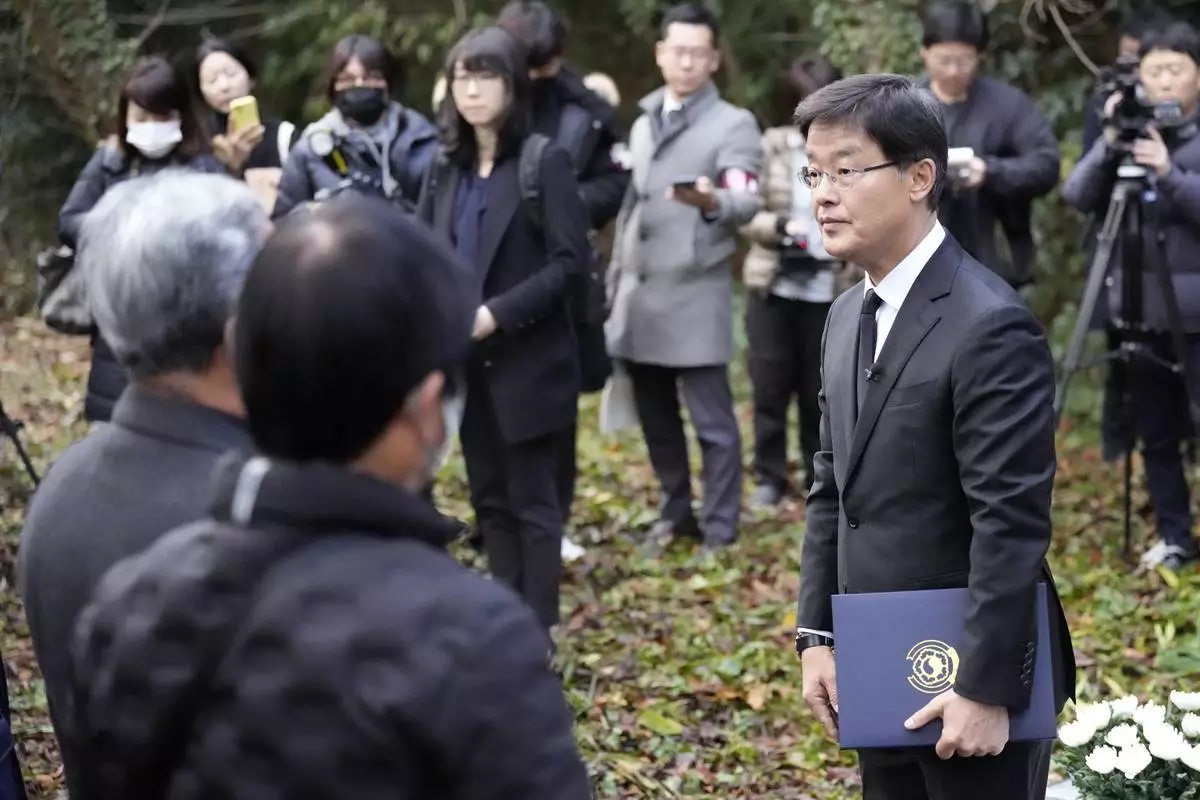
South Korean Ambassador to Japan Park Cheol-hee, right, delivers a speech to the relatives of Korean victims and South Korean officials during a memorial service at the site of former Fourth Souai Dormitory for the mine workers from the Korean Peninsula, in Sado, Niigata prefecture, Japan, Monday, Nov. 25, 2024. (AP Photo/Eugene Hoshiko)
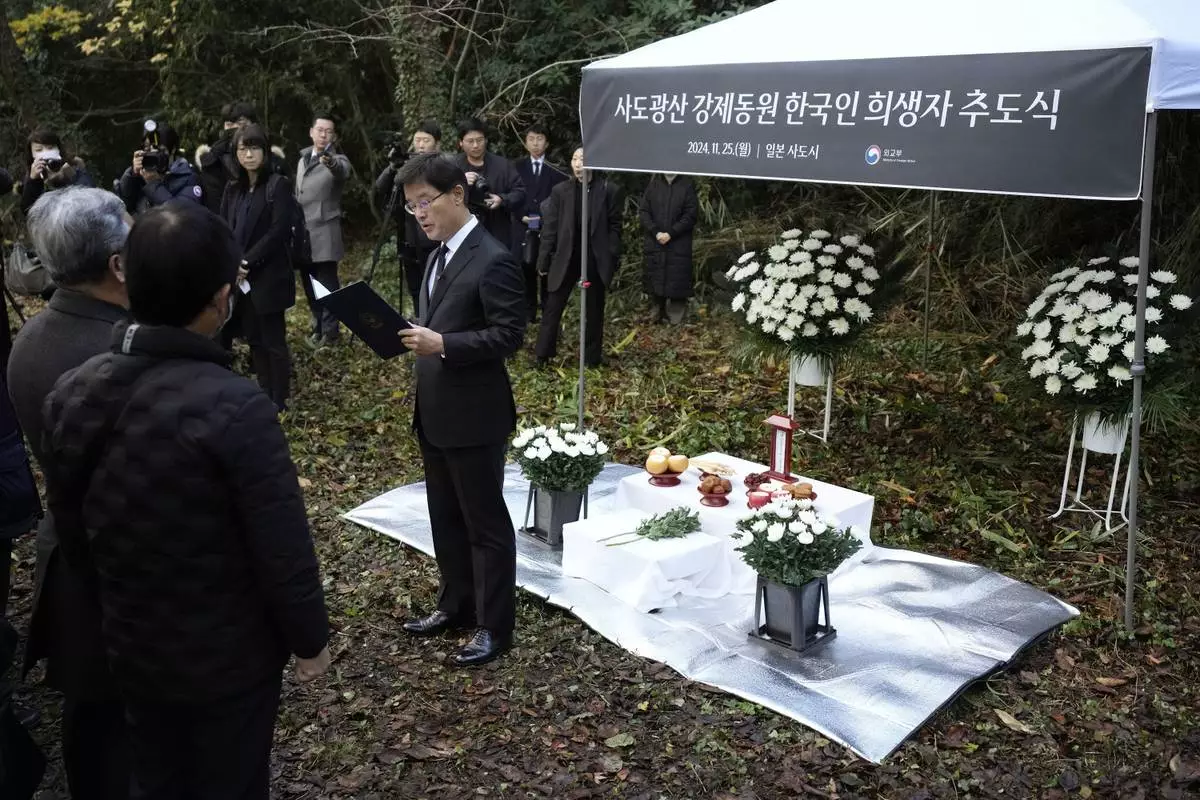
South Korean Ambassador to Japan Park Cheol-hee, center, delivers a speech as relatives of Korean victims and South Korean officials hold a memorial service in Sado, Niigata prefecture, Japan, Monday, Nov. 25, 2024. (AP Photo/Eugene Hoshiko)
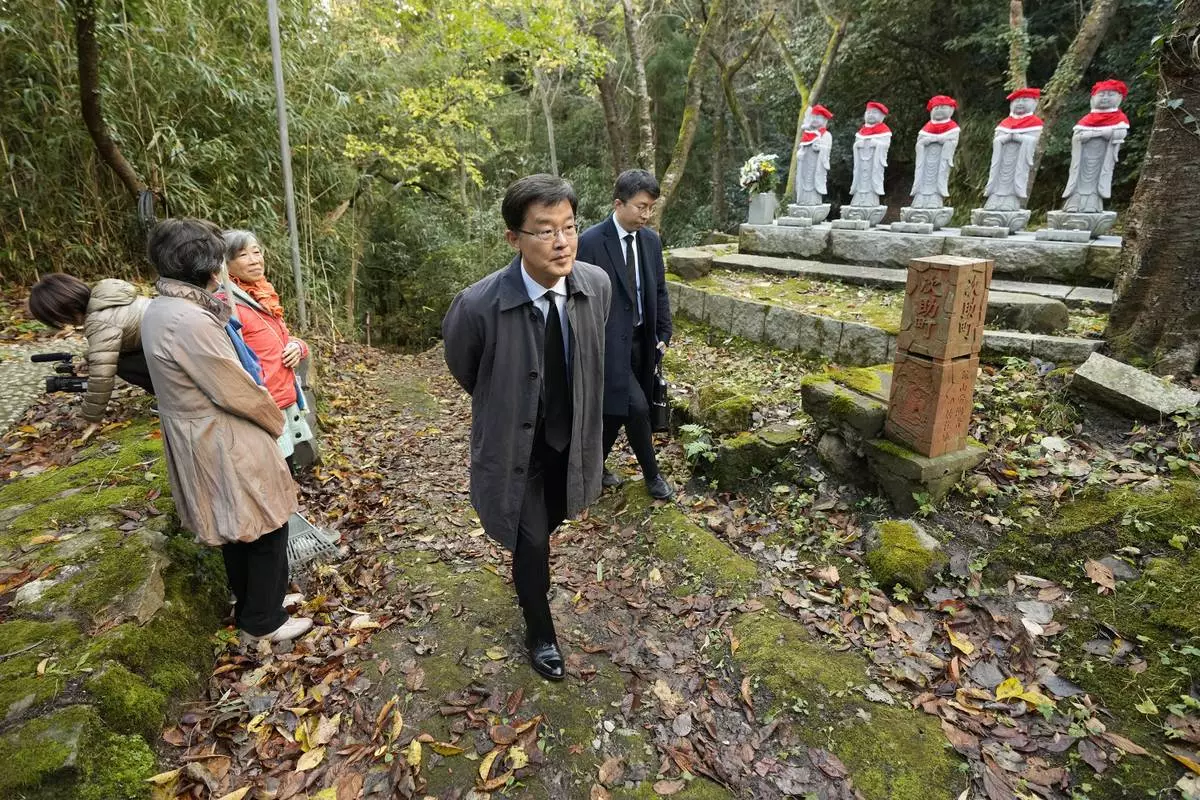
South Korean Ambassador to Japan Park Cheol-hee, center, arrives to join the relatives of Korean victims and South Korean officials to hold a memorial service in Sado, Niigata prefecture, Japan, Monday, Nov. 25, 2024. (AP Photo/Eugene Hoshiko)
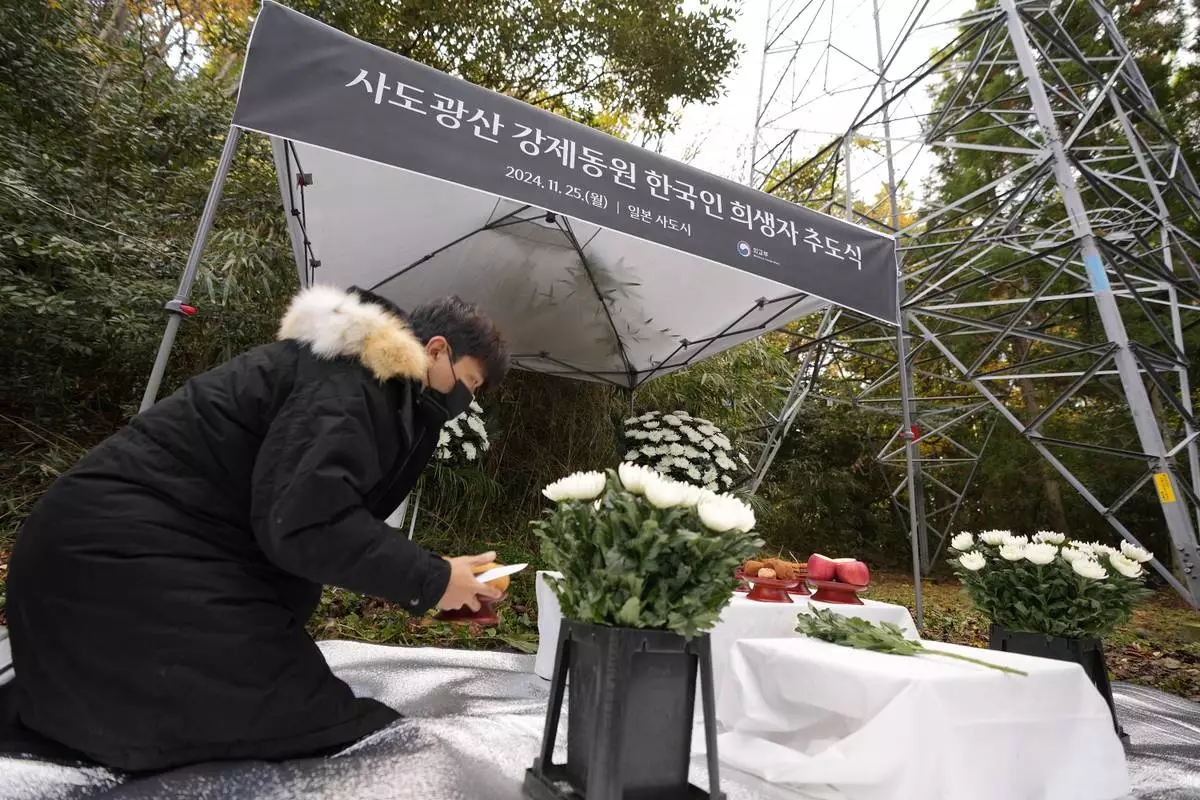
A staff prepare offerings prior to a memorial service held by relatives of Korean victims and South Korean officials in Sado, Niigata prefecture, Japan, Monday, Nov. 25, 2024, after boycotting a memorial organized by Japanese officials. (AP Photo/Eugene Hoshiko)
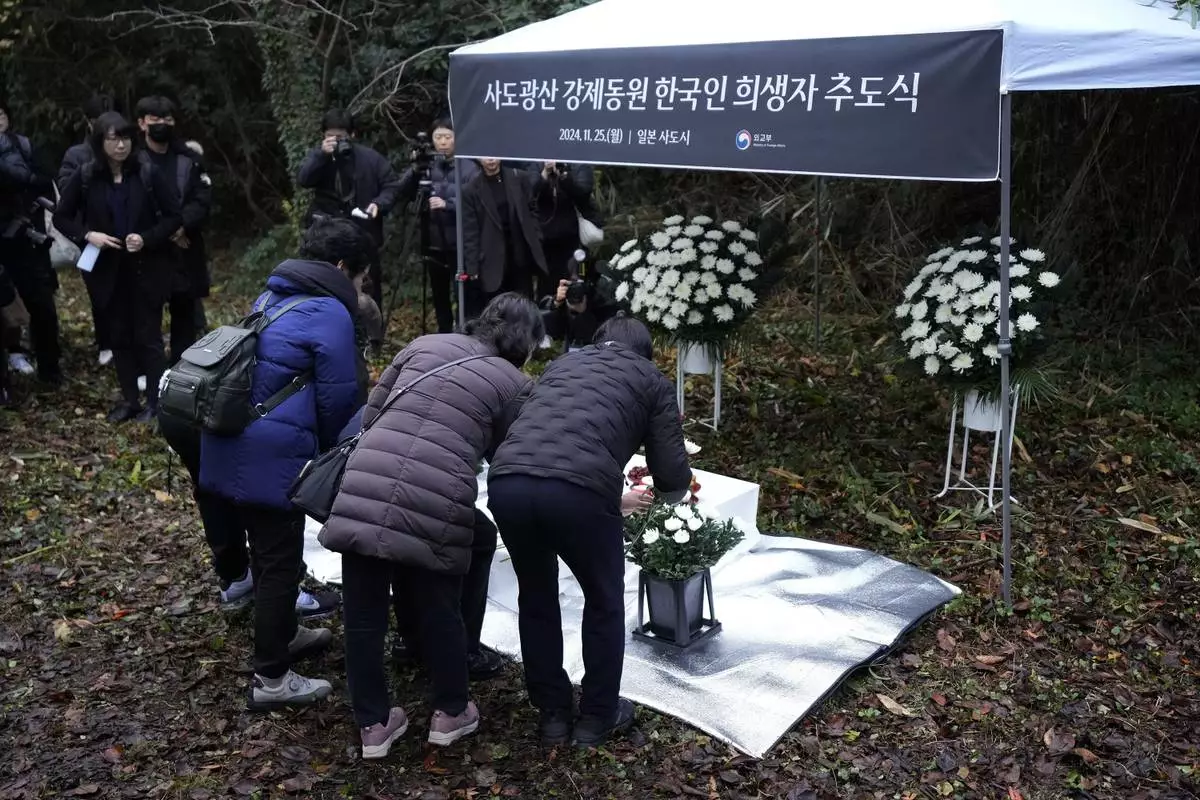
Relatives of Korean victims and South Korean officials offer flowers during a memorial service in Sado, Niigata prefecture, Japan, Monday, Nov. 25, 2024, after boycotting a memorial organized by Japanese officials. The black banner reads " A memorial service for Korean forced laborer victims at Sado Mine." (AP Photo/Eugene Hoshiko)
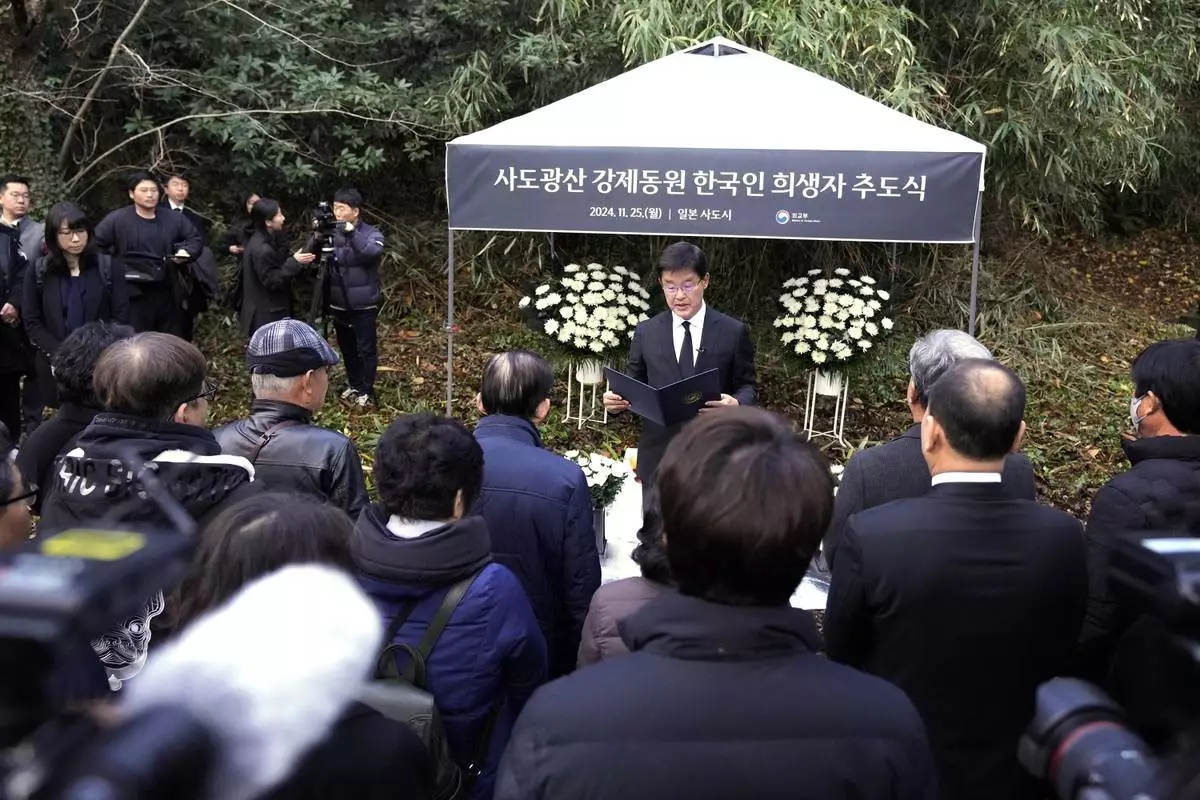
South Korean Ambassador to Japan Park Cheol-hee, center, delivers a speech as relatives of Korean victims and South Korean officials hold a memorial service in Sado, Niigata prefecture, Japan, Monday, Nov. 25, 2024, after boycotting a memorial organized by Japanese officials. (AP Photo/Eugene Hoshiko)
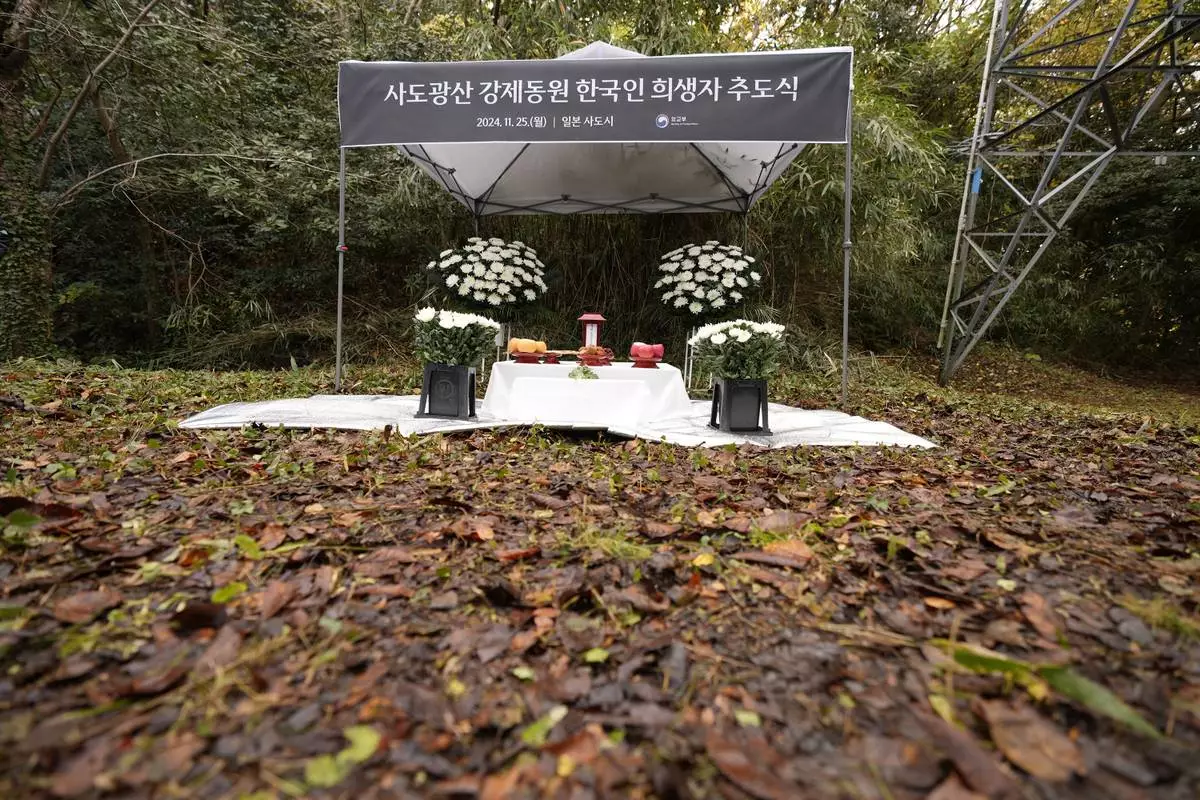
The venue of a memorial service for relatives of Korean victims and South Korean officials is seen in Sado, Niigata prefecture, Japan, Monday, Nov. 25, 2024, after boycotting a memorial organized by Japanese officials. The black banner reads "A memorial service for Korean forced laborer victims at Sado Mine." (AP Photo/Eugene Hoshiko)
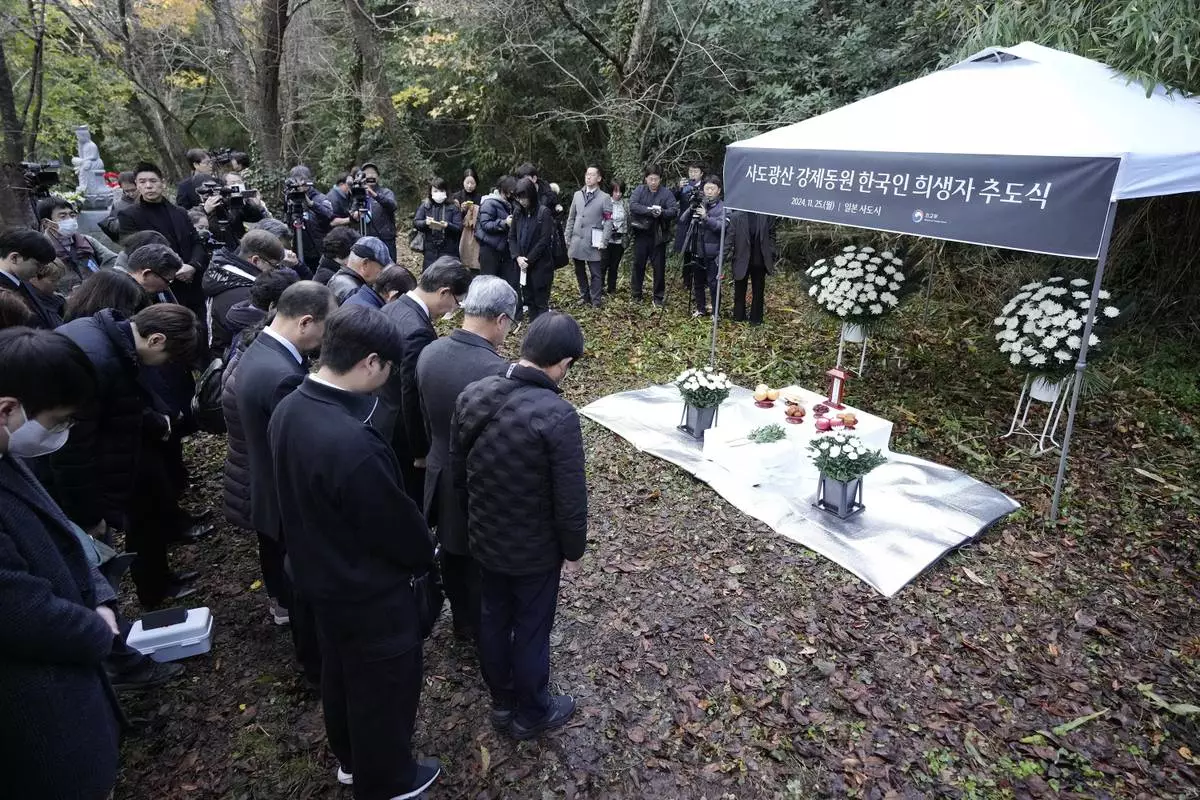
Relatives of Korean victims and South Korean officials offer a minute of silence during a memorial service in Sado, Niigata prefecture, Japan, Monday, Nov. 25, 2024, a day after boycotting a memorial organized by Japanese officials. (AP Photo/Eugene Hoshiko)



































































